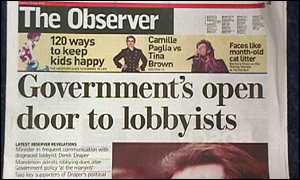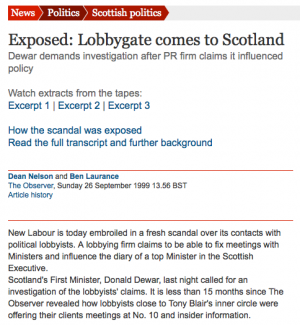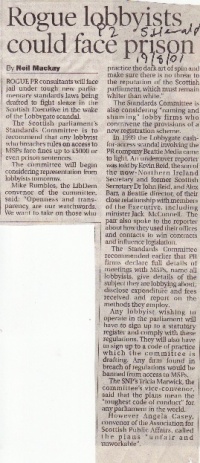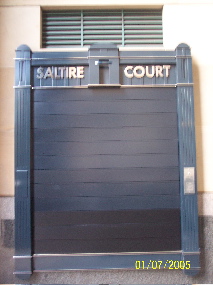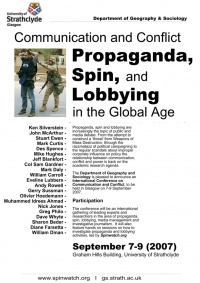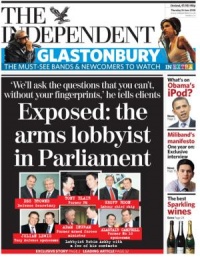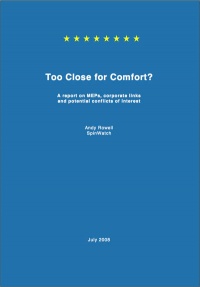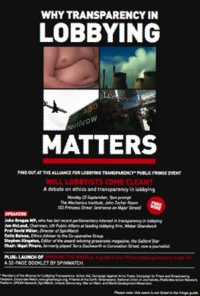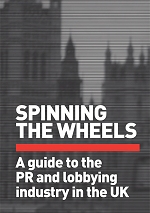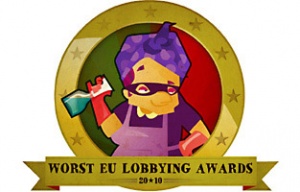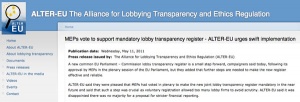Difference between revisions of "Lobbying regulation - chronology 2010-2019"
m (→November) |
(→1985) |
||
| Line 23: | Line 23: | ||
====November==== | ====November==== | ||
'''UK:''' Conservative MP [[Neil Hamilton]] begins a series of 'parliamentary interventions' (including tabling questions, giving support to early day motions, attended meetings with ministers and writing letters), all of which push forward views that are in [[Mohamed Al-Fayed]]'s interest.<ref>Lord Brown-Wilkinson, [http://www.publications.parliament.uk/pa/ld199900/ldjudgmt/jd000323/alfaye-1.htm 'Judgments - Hamilton v. Al Fayed'], 22 March 2000.</ref> | '''UK:''' Conservative MP [[Neil Hamilton]] begins a series of 'parliamentary interventions' (including tabling questions, giving support to early day motions, attended meetings with ministers and writing letters), all of which push forward views that are in [[Mohamed Al-Fayed]]'s interest.<ref>Lord Brown-Wilkinson, [http://www.publications.parliament.uk/pa/ld199900/ldjudgmt/jd000323/alfaye-1.htm 'Judgments - Hamilton v. Al Fayed'], 22 March 2000.</ref> | ||
| + | |||
| + | ===1986=== | ||
| + | '''UK:''' Conservative MP [[Tim Smith]] takes money from [[Mohamed Al-Fayed]] in return for asking Commons questions and other parliamentary activities.<ref name="Hamilton_Guardian"/> | ||
===1987=== | ===1987=== | ||
Revision as of 10:42, 1 November 2011
This page lists the history of debates on Lobbying regulation, in Scotland, at the European Union level and in the UK.
Contents
- 1 Timeline of events
- 2 1920s-1980s
- 3 1990s
- 4 2000 - 2009
- 4.1 2000
- 4.2 2001
- 4.2.1 January 14th
- 4.2.2 January 17th
- 4.2.3 January 21st
- 4.2.4 January 28th
- 4.2.5 February 2nd
- 4.2.6 February 23rd
- 4.2.7 February 25th
- 4.2.8 February 27th
- 4.2.9 February 28th
- 4.2.10 March
- 4.2.11 March 1st
- 4.2.12 March 9th
- 4.2.13 March 18th
- 4.2.14 March 25th
- 4.2.15 March 27th
- 4.2.16 April 8th
- 4.2.17 April 23rd
- 4.2.18 June 1st
- 4.2.19 June 11th
- 4.2.20 July 16
- 4.2.21 August 16
- 4.2.22 August 17
- 4.2.23 August 19th
- 4.2.24 August 20
- 4.2.25 August 22nd
- 4.2.26 August 24
- 4.2.27 August 26th
- 4.2.28 August 27th
- 4.2.29 August 29th
- 4.2.30 August 30th
- 4.2.31 September 1st
- 4.2.32 September 2nd
- 4.2.33 September 6th
- 4.3 2002
- 4.4 2003
- 4.5 2004
- 4.6 2005
- 4.7 2006
- 4.8 2007
- 4.9 2008
- 4.10 2009
- 5 2010 - 2019
- 6 Bibliography
- 7 Notes
Timeline of events
1920s-1980s
1928
USA: In the U.S.A, the Senate enacts a bill which required lobbyists to register with both the Secretary of the Senate and the Clerk of the House. The bill is blocked by the House of Representatives.[1]
1946
USA: The Federal Regulation of Lobbying Act is adopted by Congress. The term ‘lobbyist’ is defined as referring to any person who by himself, or through any agent or employee or other persons in any manner whatsoever, directly or indirectly, solicits, collects, or receives money or any other thing of value to be used principally . . . to influence, directly or indirectly, the passage or defeat of any legislation by the Congress of the United States.[2]
1973
USA: In 1973, the Senate and House Bills are introduced. Prior to this, lobbyists were required to register with and report to each house of the legislature separately.[3]
1984
UK: Mohamed Al-Fayed takes over House of Fraser, including Harrods. This begins the feud with Tiny Rowland, chairman of Lonrho, and will result in the subsequent cash-for-questions affair involving Al-Fayed, Neil Hamilton MP and Ian Greer of Ian Greer Associates.[4]
1985
October
UK: To help in his dispute with Tiny Rowland Al-Fayed employs the parliamentary lobbying firm Ian Greer Associates (IGA).[4]
November
UK: Conservative MP Neil Hamilton begins a series of 'parliamentary interventions' (including tabling questions, giving support to early day motions, attended meetings with ministers and writing letters), all of which push forward views that are in Mohamed Al-Fayed's interest.[5]
1986
UK: Conservative MP Tim Smith takes money from Mohamed Al-Fayed in return for asking Commons questions and other parliamentary activities.[4]
1987
UK: Westminster lobbyist Ian Greer of Ian Greer Associates solicits money from clients (including Harrods owner Mohamed Al-Fayed) to support the constituency campaigns of twenty six Conservative MPs.[6]
1988
UK: The House of Commons’ Select Committee on Members’ Interests begins its inquiry into the lobbying of parliament.[7]
June
UK: Evidence is given by Dr Michael Rush, a member of the Study of Parliament Group, to the Select Committee on Members' Interests. In their memorandum, Rush et al (1988) suggest:
- There is no doubt that not only has there been a growth in the number of organisations that lobby Parliament but also in the number of professional lobbying consultants, a number of whom specialise in parliamentary lobbying. Developments in this area, justifiably or otherwise, have given cause for concern and, if for no other reason, further consideration should be given to establishing a register of professional lobbyists. At the same time, it should be noted that our data would not support the view that the growth in lobbying is a product of the growth in the number of consultants, in that lobbying has grown far more than has the number of consultants.[8]
In his subsequent oral evidence to the Committee, Rush (1988) remarks:
- The only advantage I can see of a register, whether it is of professional lobbyists or lobbying organisations in the wider sense, is that it provides publicity. It opens up the process more so that Members of Parliament or members of the public may, if they wish, be able to see who is lobbying. But I take your point [MP William Shelton suggested ‘that it is almost impossible to have a register unless those who register are accorded some sort of privilege’]. I could not agree more. If you say, "As a consequence of registering you have some privilege or other, access to Members or access to certain Parliamentary papers," that is something which I think would be very difficult to control but it would also, I would say, be something to be deplored.[9]
1990s
1990
UK: At the Commons Select Committee on Members’ Interests, Greer admits making payments to MPs in return for business introductions.[6]
May
UK: Dr Michael Rush gives evidence to the House of Commons Select Committee on Members' Interests. He raises the following points: the register must have a clear purpose; with particular consideration to the question of who would be required to register, what information lobbyists would have to provide, the arrangements for keeping the register up-to-date, questions around access to the register, and whether registration confers and rights or privileges.[10]
In a later article, Rush notes that although the House of Commons’ Select Committee on Members’ Interests considered the registration of lobbyists on four occasions , it was only on the fourth that it recommended a register. He observes: In its most recent report the committee detected a sufficient shift in opinion among professional lobbyists, MPs, academics and other observers to merit recommending a register.[7]
As Rush notes, although the quarterly publication of a register would be ‘primarily informational’, the proposals included a significant regulatory element in the recommendation for a code of conduct. The code would include a complaints and arbitration procedure. Although there is no mention of penalties, being struck off the register would have ‘moral force’ which ‘would probably damage the reputation of the firm concerned’. The responsibility for compiling and maintaining the register would lie with the Registrar of Members’ Interests; with one copy available in the House of Commons Library and an additional copy available for inspection by the public.[7]
1991
1992
1993
June
UK: The proposal for a register of lobbyists is debated by the House of Commons , nearly two years after the presentation of the report by the Select Committee on Members’ Interests. Rush argues that this ‘provides clear evidence, if any were needed, that it was not a matter high on the Government’s agenda’.[7] The most significant objection of the government was that the reform would simply give an apparent ‘seal of approval’ to those registered, thereby be of most benefit to the lobbyists themselves. Favouring a voluntary code, the government referred the issue back to the committee which subsequently re-examined its proposal.[7]
Referring to what he describes as ‘The most striking lesson of the Canadian experience’[7], Rush argues that registering lobbyists has been of most value to those within the public affairs industry itself; as professional lobbyists now have a resource with which to monitor their competitors and identify potential new clients. He contests that the British government is therefore vindicated in its contention that a register would be of principal benefit to lobbyists themselves. He concedes that other lessons have been learned; namely that any register should include lobbying of the House of Lords and ‘the most important actors in the political process’: ministers and civil servants; in addition to those who directly represent (direct advocacy), those who advise (information gatherers) should be required to register; and that clearer definitions of lawyers and professional lobbyists be reached.
Rush argues that while there is no doubt that registering lobbyists can contribute to open government, there is no evidence that informational schemes have a significant impact on lobbying itself unless the information requested ‘exposes or is likely to expose lobbying abuses’.[7] Beyond the disclosure of information about fees, expenditure, and records of contacts, Rush suggests that ‘registration tends to become regulatory and the purpose of regulation is to create and maintain norms of behaviour’.[7] These norms can be enshrined in codes of conduct, legislation against certain practices, or a combination of both these approaches.
1994
May
UK: Forced by the affair to confront the problems it had previously been avoiding, the public affairs industry takes action to convince decision makers and the public about its apparent commitment to ‘ethical standards’. To this end, five consultancies came together to establish the self-regulatory Association of Professional Political Consultants (APPC) under the chairmanship of Andrew Gifford, founding director of lobbying firm GJW.[11] The APPC developed its own code of conduct and makes publicly available its register of clients. It purports to enforce a ban on financial relationships with politicians.[6]
July
UK: The story of the ‘cash-for-questions’ scandal breaks, in which a Sunday Times reporter posing as a businessman offered twenty MPs £1000 in exchange for tabling a parliamentary question. Conservative MPs Graham Riddick and David Treddinick are fined and suspended from parliament. As a result of the furore, then Conservative Prime Minister John Major establishes the Nolan Committee.[1]
October 20th
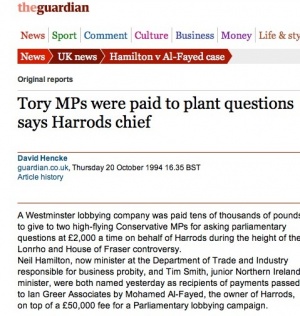
UK: In a second scandal, first reported in The Guardian, it emerges that Greer had paid Conservative MPs Neil Hamilton and Tim Smith to table parliamentary questions on behalf of Al-Fayed. Smith admits having accepting payments of £2000 per question directly from Al-Fayed - rather than from Ian Greer, as was alleged in the original Guardian report. Hamilton and Greer initiate libel proceedings against the newspaper.[1] Greer famously said to Al-Fayed, regarding his feud with Roland "tiny" Rowland over the sale of the House of Fraser, ‘You need to rent an MP just like you rent a London taxi’.[12]
October 25th
UK: Responding to concerns in the wake of the cash-for-questions affair, then Prime Minister John Major makes an announcement in the House of Commons announcing the establishment and terms of reference of the Committee on Standards in Public Life. Often referred to instead as the ‘Nolan Committee’, Sir Michael Nolan chairs the Committee from its establishment until November 1997.[13] According to an obituary in The Guardian following his death in January 2007, Nolan ‘made a profound mark on national life by substantially cleansing the Augean stable of corrupt politics as founding chairman of the Committee on Standards in Public Life’.[14] Only days after his appointment, Nolan demonstrated his independence; announcing his intention that the Committee sit in public and thereby contradicting Major’s statement that the Committee would ‘probably sit in private’.[14]
Neil Hamilton is forced to resign as Corporate Affairs Minister after Prime Minister John Major made it clear that due to the allegations against Hamilton, it would be impossible for him to carry out his responsibilities effectively.[15]
November 22nd
UK: The Members' Interests Committee consider a complaint from Alex Carlile MP over allegations that Neil Hamilton took cash for questions and failed to declare stays at the Ritz hotel, owned by Mohamed Al Fayed.[16]
1995
May 11th
UK: The First Report of the Committee on Standards in Public Life, ‘Standards in Public Life’, is published;[13] provoking what Roth describes as ‘shrieks of protest’.[14] Nolan’s Report stated that MPs should declare incomes gained from acting as parliamentary consultants; they should not be able to work as paid agents on behalf of lobbyists; and they should end their self-regulation with the introduction of a permanent and independent parliamentary commissioner.[14] The Report set out the ‘Seven Principles of Public Life’ (the ‘Nolan Principles’) as follows:
- Selflessness – Holders of public office should act solely in terms of the public interest. They should not do so in order to gain financial or other benefits for themselves, their family or their friends.
- Integrity – Holders of public office should not place themselves under any financial or other obligation to outside individuals or organisations that might seek to influence them in the performance of their official duties.
- Objectivity – In carrying out public business, including making public appointments, awarding contracts, or recommending individuals for rewards and benefits, holders of public office should make choices on merit.
- Accountability – Holders of public office are accountable for their decisions and actions to the public and must submit themselves to whatever scrutiny is appropriate to their office.
- Openness – Holders of public office should be as open as possible about all the decisions and actions they take. They should give reasons for their decisions and restrict information only when the wider public interest clearly demands.
- Honesty – Holders of public office have a duty to declare any private interests relating to their public duties and to take steps to resolve any conflicts arising in a way that protects the public interest.
- Leadership - Holders of public office should promote and support these principles by leadership and example.[17]
June 8th
UK: The Members' Interests Committee conclude that although Neil Hamilton was "imprudent" not to have registered his stay at the Ritz, no further action will be taken.[16]
November
UK: PR Week reports that despite having apparently ‘captured the moral high ground’ by setting up its own register of lobbyists, the APPC remained ‘coy’ about revealing the contents of the register. During the making of a Channel 4 Dispatches programme on peers and their outside interests, Observer Films attempted to gain access to the register - and were duly informed that the contents were not open to the public. This was confirmed by then APPC Secretary and managing director of the lobbying firm Public Policy Unit, Charles Miller, who explained that the register was only available to MPs, Peers, APPC members and their clients: ‘it does not exist to feed salacious stories in the media’. However, this position was not uniformly agreed upon within the industry.[18] Michael Burrell of Westminster Strategy, one of the founders of the APPC, remarked ‘We were trying to promote greater transparency and disclosure. My view is the register should be made available to journalists’. Miller responded: If other members feel like Michael, I dare say we will open it up... we are going to have think very carefully about way the clients are listed at present - it’s too easily misinterpreted.[18]
November 15th
UK: Sir Gordon Downey becomes Parliamentary Commissioner for Standards serving the Committee for Standards and Privileges.[16]
1996
March
UK: The APPC announces its intention to move to publishing its previously annual register of membership twice yearly. Additionally, whereas the register could previously only be accessed via the Association offices in Rochester Row, it was now to be available by post. Michael Burrell remarks that ‘Some members felt that yearly publication meant the register was too historic’.[19]
May 16th
UK: The Second Report, ‘Local Public Spending Bodies’, of the Committee on Standards in Public Life is published.[13]
July 4th
UK: The Defamation Bill gains Royal Assent. The bill alters the 300-year-old Bill of Rights and allows MPs to waive Parliamentary privilege. The effect of this is that Neil Hamilton can now give evidence in court on statements he made in the House of Commons.[16][20]
September 30th
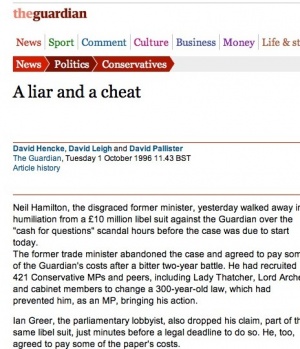
UK: Neil Hamilton and Ian Greer drop their libel suit against the Guardian over the "cash for questions" scandal just hours before the case was due to start. The Guardian reported:
- Neil Hamilton, the disgraced former minister, yesterday walked away in humiliation from a £10 million libel suit against the Guardian over the "cash for questions" scandal hours before the case was due to start today.
- The former trade minister abandoned the case and agreed to pay some of the Guardian's costs after a bitter two-year battle. He had recruited 421 Conservative MPs and peers, including Lady Thatcher, Lord Archer and cabinet members to change a 300-year-old law, which had prevented him, as an MP, bringing his action.
- Ian Greer, the parliamentary lobbyist, also dropped his claim, part of the same libel suit, just minutes before a legal deadline to do so. He, too, agreed to pay some of the paper's costs.
- The Guardian stated on October 20, 1994, that Mr Hamilton had received thousands of pounds for asking parliamentary questions for Mohamed Al Fayed's Harrods group. Mr Greer, who had been retained by Mr Al Fayed, was identified as the middleman.[21]
From the BBC:
- Libel case is dropped following exposure that Mr Hamilton, as a junior Trade Minister, told his boss, Michael Heseltine, that he did not have a financial relationship with Mr Greer, although he had received two £5,000 commission payments for the introduction of new business.
- This led to a "conflict of interests" between Mr Greer and Mr Hamilton which meant that they required two separate lawyers - which they could not afford, thus having to drop the case.[16]
October
UK: The APPC announces that it will be extending its code of conduct to ban its members from having financial links with sitting peers and MEPs, as well as MPs and public servants. Members are also explicitly prohibited from making contributions to political parties. The Association reports that it is ‘stepping up its marketing efforts’; investigating the creation of ‘developing a new visual identity’; and creating an online presence.[22]
October 3rd

UK: Prime minister John Major states that he will forward all 'cash for questions' evidence to Sir Gordon Downey for him to consider.[16]
1997
January 16th
UK: A Channel 4 documentary about the 'cash for questions' scandal, entitled 'A Question of Sleaze', is transmitted. It includes an interview with Mohamed Al Fayed.[4]
April 8th
UK: BBC war correspondent Martin Bell enters the fray and decides to stand as an anti-corruption candidate. The Guardian reports:
- Mr Bell, wearing the white suit he made famous covering the Bosnian war, told a London press conference that the hostility towards Mr Hamilton he had found on a visit to Tatton had made a deep impression on him.
- "I have been aware of the deep unhappiness of the people there. It's as if there's a kind of poison in the democratic system which means (it) is not able to operate," he said.
- He insisted he was an independent, though he had been prompted to stand by both Labour and the Liberal Democrats. As the anti-corruption candidate, he knew he would face intense scrutiny of his private life and offered to throw open his bank accounts and tax returns to any reporter who wanted to investigate. He described standing as scarier than facing Sniper Alley in Sarajevo.[23]
June 21st
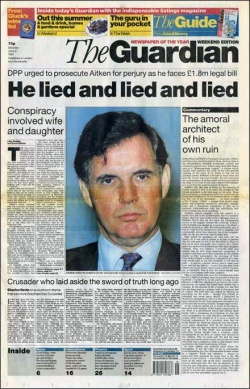
UK: After the collapse of Jonathan Aitken's libel trial, The Guardian calls on the Director of Public Prosecutions to prosecute Jonathan Aitken for perjury and conspiracy to pervert the course of justice. The Guardian reported:
- Aitken, the former cabinet minister, discontinued his libel action against the Guardian and Granada Television after new evidence proved he had lied to the High Court. He now faces public disgrace and a legal bill for pounds 1.8 million.
- Aitken, who lost his Thanet South seat at the election, failed to turn up for yesterday's two-minute hearing, in which his counsel, Charles Gray QC, agreed Aitken would pay almost all of the defendants' legal bill.
The Guardian article continues:
- The Guardian's editor, Alan Rusbridger, last night wrote to Paul Condon, the Commissioner of Metropolitan Police, and the Director of Public Prosecutions, Dame Barbara Mills, to investigate what he described as 'a well-laid and carefully co-ordinated conspiracy to pervert the course of justice'.[24]
July 3rd
UK: A report commissioned by Parliament is published by Sir Gordon Downey, Parliamentary Commissioner for Standards serving the newly-formed Committee for Standards and Privileges. In the report, ‘Complaints from Mr Mohamed Al Fayed, The Guardian and others against 25 Members and former Members’, Greer, Hamilton and Smith are cleared of the original allegation that Greer had paid the MPs to table questions. However, Downey rules that the testimonies from three of Al-Fayed’s employees that they processed cash payments to Hamilton amounted to ‘compelling evidence’; though he refutes their claims that payments were processed to Greer. In the eventual Hamilton/Al-Fayed libel trial at the High Court in 1999, Hamilton loses and is ordered to pay costs; eventually declaring himself bankrupt in 2001.[1]
July 8th
UK: The Third Report of the Committee on Standards in Public Life, ‘Standards of Conduct in Local Government in England, Scotland and Wales’, is published.[13]
November 7th
UK: The Fourth Report, ‘Review of Standards of Conduct in Executive NDPBs, NHS Trusts and Local Public Spending Bodies’, of the Committee on Standards in Public Life is published and Lord Nolan is succeeded as chairman by Sir Patrick Neill QC. On the 12th November, Prime Minister Tony Blair extends the Committee’s terms of reference: ‘To review issues in relation to the funding of political parties, and to make recommendations as to any changes in present arrangements’.[13]
1998
March
UK: The APPC sets out to review its sponsorship rules to consider allowing the sponsorship of political events by lobbyists' clients. Although the existing rule prohibited members from causing a client to give financial incentives to public servants (or persons acting on their behalf), representatives or employees of Parliament; except for entertainment and token business mementos, APPC secretary Charles Miller remarked:
- We’ve all broken that rule. If approached by Government, lobbyists should be able to ask their clients whether they are interested, but they can’t push anybody - a lobbyist’s first duty is to the client... Labour is increasingly wooing business directly through the party’s business unit and not through lobbyists anyway.[25]
July
UK: The series ‘Lobbygate: Cash for Access’ is published by Greg Palast and Antony Barnett in The Observer.[26] The investigative accuses three consultancies (two of which are members of the APPC) of unethical behaviour; particularly with regard to bragging about having close links to politicians. The APPC launched an inquiry from which emerged a series of recommendations endorsed by the Association and designed to foster a ‘culture of compliance’ with the APPC code of conduct amongst member consultancies; prompting APPC 2006 management committee member Michael Burrell to conclude:
- Partly as a result – and while there will never be room for complacency – one could reasonably claim that the professional political consultancy business in the UK today has one of the best ethical track records of any in the world.[6]
July 12th
July 17th
UK: The APPC comes out in support of a single lobbyists’ code, despite traditionally opposing the idea of running a joint code with the Institute of Public Relations (IPR, now Chartered Institute of Public Relations) and the Public Relations Consultants Association (PRCA). The APPC had previously resisted closer association with the PR industry, holding lobbying to be a distinct industry. The PRCA, however, also represents full service agencies such as Hill and Knowlton and Burson-Marsteller which run large lobbying operations - and are not members of the APPC.[27]
October 13th
UK: The Fifth Report, ‘The Funding of Political Parties in the United Kingdom’, of the Committee on Standards in Public Life is published.[13]
1999
September 26th
Scotland: The Observer breaks the Scottish 'Lobbygate' story:
- New Labour is today embroiled in a fresh scandal over its contacts with political lobbyists. A lobbying firm claims to be able to fix meetings with Ministers and influence the diary of a top Minister in the Scottish Executive.
- Scotland's First Minister, Donald Dewar, last night called for an investigation of the lobbyists' claims. It is less than 15 months since The Observer revealed how lobbyists close to Tony Blair's inner circle were offering their clients meetings at No. 10 and insider information.
- At the centre of the affair is Kevin Reid, the son of the Scottish Secretary and leading Blair ally Dr John Reid. Kevin worked for the Labour Party before joining the PR agency Beattie Media to head its political lobbying arm.
- In a secretly filmed meeting with an Observer reporter posing as a potential client, Reid boasted: 'I know the Secretary of State very, very well because he's my father.'
- Beattie launched its lobbying arm last summer when it appointed Jack McConnell, then General Secretary of the Scottish Labour Party.
- The Observer's businessman was told McConnell had been taken on 'in the certain knowledge that Jack would get a safe seat from the Labour Party', said a Beattie director, 'and in the hope and expectation that he would also get a Cabinet position within the new administration.'
- After quitting Beattie's lobbying arm, McConnell became Scotland's Finance Minister.
- In a meeting with The Observer's businessman, Reid and Beattie Media director Alex Barr claimed the firm had:
- Arranged for Scottish Sport Minister Sam Galbraith to be entertained by the Scottish Premier League (SPL) at a Rangers European cup tie to lobby for money for soccer training;
- Helped persuade Transport Minister Lord Macdonald to grant transshipment rights at Prestwick Airport to US couriers Federal Express;
- Enjoyed regular contact with Finance Minister Jack McConnell;
- Been able to place an engagement in his diary through a former Beattie employee who had become his personal assistant.
- A government spokesman yesterday confirmed that Galbraith had been lobbied at a Rangers game, but strongly denied Labour had included the policy in its manifesto as a result.[28]
October 13th
UK: A Consultation Paper setting out the issues and questions that the Committee on Standards in Public Life proposes to consider in its review of recommendations in its First Report is published. [13]
October 24th
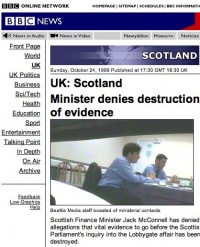
Scotland: Jack McConnell refutes allegations that evidence to go before the Scottish Parliament's inquiry into the Lobbygate affair had been destroyed. The BBC report:
- Newspaper reports said records of contacts between Mr McConnell and his secretary and the lobbyists at the centre of the controversy would not be available to the parliament's standards committee.
- However, Mr McConnell has issued a statement in which he described the allegations as "totally untrue" and said he was the victim of a smear campaign.
- The committee is due to hear evidence on Monday from Mr McConnell and his secretary Christina Marshall following allegations that lobbyists from Beattie Media were offering improper access to ministers and Mr McConnell in particular.[29]
November 18th
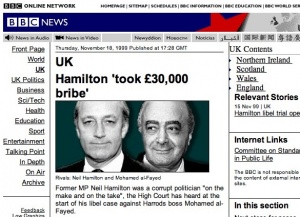
Scotland: Standards Committee (1999), “Report of an inquiry into matters brought to the attention of the committee by The Observer newspaper”, First Report, SP paper 27, ST/99/R1, 18 November, para 34-35, available at: www.scottish.parliament.uk/s1/official_report/cttee/ stan99-00/str01-1.htm#conclusions
UK: Neil Hamilton's libel case against Harrods boss Mohamed Al Fayed begins at the High Court in London. The BBC reports:
- Former MP Neil Hamilton was a corrupt politician "on the make and on the take", the High Court has heard at the start of his libel case against Harrods boss Mohamed Al Fayed.
- George Carman, QC, making his opening speech for Mr al-Fayed, told Mr Justice Morland and the jury of six men and six women that the case was all about "corruption in politics".
- Mr al-Fayed says Mr Hamilton accepted money from him to ask parliamentary questions on his behalf.[30]
December 22nd
UK: After 5 weeks the jury of the libel action, brought by Mr. Hamilton against Mr Al Fayed, returns its verdict. The Guardian reports:
- Neil Hamilton's five-year fight to clear his name ended in ignominious defeat and financial ruin last night when a high court jury unanimously declared the former Conservative MP corrupt.
- The result ended any hopes he may have harboured of resuming his political career, condemning him as a greedy man who had been "on the make and on the take" during his time in parliament.
- The verdict, delivered in the highly-charged atmosphere of a crowded court 13 at the high court in London, was a dramatic finale to the bruising five-week libel trial brought by the former minister against the owner of Harrods, Mohamed Al Fayed. It brought to an end his protracted battle to clear his name of the cash-for-questions controversy first reported by the Guardian in 1994.
- After almost nine hours of deliberation, the jury returned to court yesterday to deliver its verdict. Asked whether members had found "on the balance of probabilities" that Mr Fayed had established corruption by Mr Hamilton "on highly convincing evidence", their forewoman replied: "Yes."[31]
2000 - 2009
2000
January 12th
UK: The Sixth Report, ‘Reinforcing Standards – A Review of the First Report of the Committee on Standards in Public Life’, is published by the Committee on Standards in Public Life.[13]
October 25th
Scotland: The Standards Committee issues its first consultation paper Lobbying in the Scottish parliament: consultation paper[32] The paper asked twenty seven questions about lobbying including sixteen attempting to gather information on the practice of lobbying by respondents. The last eleven questions asked for view about the 'regulation of lobbyists' including posing the two alternatives thought to be up for discussion:
- 3.1 Would you support the establishment of a statutory registration scheme for professional lobbyists?
- 3.2 In your view what would be the benefits of introduction of statutory regulation of lobbyists?
- 3.3 In your view what would be the drawbacks of introduction of statutory regulation of lobbyists?
- 3.4 If you support statutory regulation, who do you think should administer the regulatory scheme? How should it be `policed' and what sanctions should be available?...
- 3.9 In your view what would be the benefits of introduction of voluntary code of conduct for lobbyists as outlined in this paper?
- 3.10 In your view what would be the drawbacks of introduction of a voluntary code of conduct?
- 3.11 In your view what should be the principal components of a voluntary code and how widely should it be drawn? How should it be 'policed' and what sanctions should be available?[32]
December 5
Scotland: Deadline to respond to the Standards Committee consultation on lobbying. Stirling Media Research Institute submits evidence to the standards committee consultation on lobbying the Scottish Parliament. It states that SMRI 'has been engaged in an ongoing programme of research into the public relations and lobbying industry in Scotland, the UK and Europe since 1996.':
- We have been encouraged by the Standards Committee's recognition of the importance of lobbying as a matter of both professional and public concern, and we welcome the opportunity to respond to the consultation paper. Our contribution is offered in the spirit of independent academic analysis. We have monitored the growth and development of the lobbying industry in Scotland and interviewed a wide range of lobbyists and public relations professionals ranging across the commercial (consultancy and in-house) and voluntary sectors.[33]
November 16th
UK: The Seventh Report, ‘Standards of Conduct in the House of Lords’, is published by the Committee on Standards in Public Life.[13]
2001
January 14th
Scotland: The Sunday Herald reported the findings of the SMRI research on lobbying. The Sunday Herald states the findings suggest the Scottish Executive is less open about corporate influence and lobbyists than the UK government.[34]
January 17th
Scotland: The Standards Committee of the Scottish Parliament Issued an Interim report outlining the main themes in the responses to its consultation paper on lobbying. According to PR Week:
- It received 29 responses which included the four public affairs umbrella organisations, three public affairs agencies, two public bodies, two trade unions, one charity and one private sector company.[35]
The report also noted that 'The majority of respondents remain opposed to statutory regulation.'[35]
January 21st
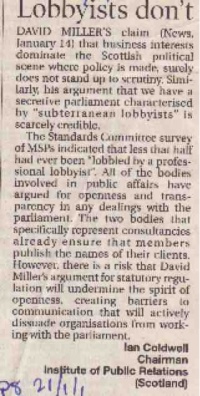
Scotland: Ian Coldwell of the Institute of Public Relations hits back at claims that business interests dominate Scottish politics and objects to the charge that lobbyists operate in a 'subterranean' manner in the Letters page of the Sunday Herald:
- David Miller's claim that business interests dominate the Scottish political scene where policy is made, surely does not stand up to scrutiny. similarly, his argument that we have a secretive parliament characterised by "subterranean lobbyists" is scarcely credible.[36]
Coldwell went on to raise the traditional lobbyist defence that openness and transparency will undermine openness and transparency:
- David Miller's argument for statutory regulation will undermine the spirit of openness, creating barriers to communication that will actively dissuade organisations from working with the parliament.[36]
January 28th
Scotland: David Miller, William Dinan and Philip Schlesinger of the Stirling Media Research Institute issue a response to Ian Coldwell, Chairman of the Institute for Public Relations (IPR) in Scotland. In the letter, published in the Sunday Herald they state:
- "Ian Coldwell, Chairman of the Institute for Public Relations (IPR) in Scotland takes us to task for claiming that lobbyists are subterranean creatures (Reader's Views, January 21). He claims that all the lobbying trade associations have argued for openness and transparency in their dealings with the parliament. This is misleading. In fact every single lobbying and Public Relations trade body (including the IPR) argued against disclosure in their responses to the Standards Committee consultation on lobbying."[37]
February 2nd
Scotland: PR Week 'reports on moves to ensure the Scottish Parliament is wiping the lobbying slate clean'. It reported:
- Back-handers, bribes, favours of a dubious nature - it's not what you know, but who; the world of Scottish public affairs, lobbying, call it what you will, is a shady one, wreathed in a Celtic mist that obscures the view of openness and truth.
- A bit of an exaggeration maybe, but with the shenanigans surrounding the Scottish Executive's investigation into the world of lobbyists you might just believe it.
- Stirling University has just released details of a report that seems to confirm this misleading perception. On 14 January The Sunday Herald published an article, paranoia-inducingly headlined 'Mound more secretive than Westminster', that arguably exacerbates the report's findings.[38]
February 23rd
Scotland: Simon Nayyar, chairman of the Public Relations Consultants Association's Public Affairs Committee, writes to the Stirling Media Research Institute (SMRI) highlighting concerns over written evidence submitted to the Scottish Parliament Standards Committee by the SMRI. In the letter Mr. Nayyar states:
- There are a number of points in your written evidence with which we have concerns, and given that the SRMI (sic) has been called to give oral evidence to the committee on 28 February 2001, we thought you might find it helpful to have the opportunity to discuss these points with us ahead of this evidence session.[39]
The full letter can be viewed here.
February 25th
Scotland: Article of Interest: Kenny Farquharson 'MSPs warned over lobbyists' Sunday Times Scotland, February 25 2001. No longer available online.
February 27th
Scotland: Broadcast: William Dinan, Scottish Parliament inquiry into the regulation of lobbying, BBC Newsnight Scotland, 27 February 2001.
February 28th


UK: The Prime Minister Tony Blair announces that Sir Nigel Wicks is to be appointed as the new Chairman of the Committee on Standards in Public Life.[13]
Scotland: William Dinan and Philip Schlesinger of the Stirling Media Research Institute give evidence at the Standards Committee inquiry on lobbying.[40] SMRI also submits a written paper to the committee which examines the way in which lobbying regulation is accomplished in the US and Canada.
March

Scotland: In March 2001 Polygon published Open Scotland? Journalists, Spin Doctors and Lobbyists, the findings of an ESRC funded study on political communication and devolution.[41] The book was claimed to be:
- The first comprehensive coverage of political communications in Scotland
- Reveals the inside story of broadcasting, journalism, lobbying and spin doctors in Scotland
- Draws on interviews with key players and private documentation never previously made public[42]
According to the blurb:
- Scottish devolution brought high hopes for an open political culture. But how far have these been fulfilled? Open Scotland? argues that in the field of political communication the old, established ways of the British state still remain firmly in place. Westminster and Whitehall cast long shadows over Edinburgh.
- This book offers the first full-scale coverage of how media, politicians and lobbyists interact in the new Scotland. Based on their exceptional first-hand access to the key players, Philip Schlesinger, David Miller and William Dinan have written an inside account of the struggles to establish the rules of the game for covering politics. They have talked to the journalists of Scotland's political media pack who are at the heart of the new political system and who have made a decisive impact on the image of the Scottish Parliament and government. They have observed and interviewed the professional lobbyists and reveal their strategies for achieving a respectable image in Scottish public life. And they have analysed some of the key rows and the failures of news management inside Scotland's government.[42]
Scotland: Stirling Media Research Institute submits supplementary evidence to the Standards committee reporting on a survey of US and Canadian officials involved in the regulation of lobbying.[43] The survey was emailed to some 68 officials, 30 of whom responded. the respondents were 'mainly from the state and federal levels in th US and Canada' all of whom had 'experience of lobbying regulation'.[43] According to the SMRI:
- The most striking finding from our survey is that none of our 30 respondents believed that registration presented a barrier to participation in the democratic process. Many suggested that registration could promote wider participation in the democratic process.[43]
The researchers concluded that:
- The evidence from our survey suggests that lobbying regulation does work in principle and in practice. Of course it is possible that any system may need to be looked at again in the future to take account of experience or developing circumstances, but this is not a reason to postpone making a start now.[43]
A full transcript of the evidence is available here.
March 1st
Scotland: The Scotsman reports on Professor Philip Schlesinger and William Dinan giving evidence before the Scottish Parliament's Standards Committee:
- Professor Philip Schlesinger and William Dinan, giving evidence before the Scottish parliament's standards committee, said all groups who sought to influence the decision-making process should be regulated and money spent on lobbying campaigns disclosed.
- Prof Schlesinger rejected claims from the SNP's Tricia Marwick that a voluntary code of conduct for lobbyists would be preferable to a set of strict regulations laid down by parliament. He said an open register of the activities of lobbying firms would stop the public being suspicious of the way the political system works.
- He said: "We are dismayed by the lack of trust in the political system. Almost every week there are implications about how ministers conduct themselves and unless the public is broadly convinced that there are a set of clear-cut rules, that lack of trust is only going to increase." Prof Schlesinger also dismissed fears that forcing lobby firms to be regulated would create an elite of registered lobbyists and prevent smaller groups from taking their cases to parliament.[44]
March 9th
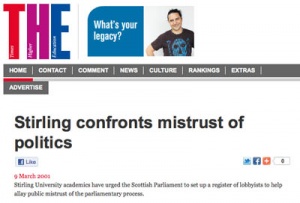
Scotland: The Stirling Media Research Institute urge the Scottish Parliament to set up a register of lobbyists. The Times Higher Education Supplement reports:
- Stirling academics have been researching public relations and the lobbying industry since 1996, partly funded by the Economic and Social Research Council. Researcher William Dinan said there were serious problems with lobbyists' self-regulation and voluntary codes of conduct at Westminster.
- "Derek Draper, who was at the centre of the recent cash-for-access scandal at Westminster, admitted in his evidence to the Neill committee that he did not have a clue about how self-regulation worked," he said.
- "In the United Kingdom there are no examples of self-regulation exposing corrupt practice or addressing questions of the probity of lobbyists. That has always been done by investigative journalism and the media. It is not in the interests of the industry to expose bad practice, as that makes it all look bad." [45]
Scotland: Philip Schlesinger, director of Stirling University's media research institute gives evidence to the Scottish Parliament's standards committee. Schlesinger states:
- We intend to stick to our guns and say what we think, despite the attempt by one lobbying trade organisation to lobby us in advance of this hearing, perhaps a classic example of lobbying gone wrong.[46]
March 18th
Scotland: The Sunday Herald reports on issues raised in the book Open Scotland? and in particular with regards to journalists who work for broadcast news organisations whilst also training Scottish civil servants in how to handle the media. The Sunday Herald reports:
- Open Scotland? author Miller says that he had no evidence that financial links with the Scottish Executive had influenced any journalist's work, but he was concerned that there could appear to be a conflict of interest.
- "My view is that journalists really should not get involved with government publicity. It blurs the line between journalists as independent of the state and journalists as mouthpieces of the state. They are employees of the Executive while they do that work."
- The book states: "In a country as small as Scotland, with such close personal and cultural links between the media and the political elite, it might be argued that adding further economic links raises the potential for a serious conflict of interest."[47]
March 25th
Scotland: Douglas Fraser, political editor for The Sunday Herald, reports on the findings from the Stirling Media Research Institute's study into the effects of devolution on Scottish politics, governance and transparency. Fraser reports:
- A PARLIAMENT was intended to open Scotland up. The vast machinery of government that had ticked over without much democratic scrutiny would be put on public view, and those wielding power would be held accountable. That was the ideal. The reality has been very different, according to the most thorough research project into the effects devolution had in its first year on making Scottish politics and government more transparent.
- The project at Stirling University's media research institute publishes its findings in full next week, with the main points revealed exclusively today in the Sunday Herald. The key outcome is that for all the emphasis and expenditure on presentation and for all the extra press officers, Scotland remains far from open. That is because politicians indulged in damaging "spin wars" with each other; because the civil service failed to reform itself; because lobbyists continued to operate, unregulated, in the shadows; and because journalists (including this writer, presumably) colluded to make sure they were the ones who had control over access to politicians. They find the Scottish home rule project suffered from basing itself too closely on the Westminster and Whitehall model it was seeking to avoid.[48]
March 27th
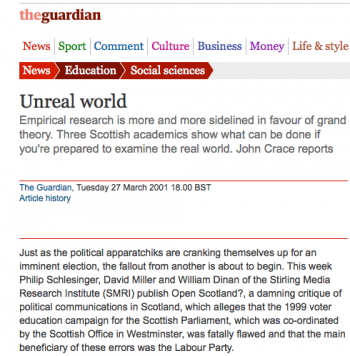
Scotland:The Guardian reports the publication of Open Scotland? noting that 'Empirical research is more and more sidelined in favour of grand theory' in the Universities and stating that 'Three Scottish academics show what can be done if you're prepared to examine the real world'. Open Scotland? is described as 'a damning critique of political communications in Scotland'.[49]
- Empirical research into political trends has become unfashionable these days, Miller contends. "Many of the radicals of the 60s and 70s have drifted off into the arcane language game known as postmodernism or to other exotic theories from the left bank, in which nothing but language was real," says Miller. "As a result, not only did they not do empirical research on the real world, but some of them didn't even believe that there was a real world to research. With the abandonment of concepts of truth and reality, it became rather hard for researchers to point out the latest piece of government misinformation, secrecy or manipulation."...
- Miller goes on to say that to many of the new breed of academics, whose desire to climb the greasy pole is matched only by their reluctance to rock the boat, the notion of independent research is anathema. It doesn't pay well, it's time-consuming and it's potentially controversial. None of which is exactly career-enhancing within the academic establishment. "You do get whispering campaigns," says Miller. "You hear that such and such a person is a trouble maker, and before long the gossip has become fact. No wonder so many academics are frightened of looking into areas where they're not wanted. Jobs are hard to come by, and the structures by which academic performance is measured are designed to favour consensus. The Research Assessment Exercise gives far greater reward to academics whose articles appear in international peer-reviewed journals, which research has shown are read by an average of between 1.5 to 6 people, than to those who are prepared to engage in a more public debate."[49]
According to The Guardian: 'three people who are almost certain to find themselves crossed off Tony and Cherie's guest list - assuming they were ever on it - are Schlesinger, Miller and Dinan.'[49] The report also stated: 'Not one to mince words, Miller argues that academics too often leave it to journalists to dig out political scandals; and that many of their peers have been neglecting their duties to the public in this area. "Academic salaries are paid for out of public funding," Miller points out.'[49] The report also notes that the research on lobbying in Scotland was being used in a knowledge exchange process:
- The research team is now at the forefront of the campaign for the lobbying system in the new parliament to be regulated... And while it may not always produce the results that the government has in mind, it still attracts kudos and respect for its independence. "We are consulted by government and other official bodies, who regard us as a source of relevant advice," says Schlesinger. "The key issue for me is that we're attempting to do some public policy research and present public interest arguments about devolution which seem not to be coming from anywhere else just now. This is a key role for academia. In my view it sets us apart from thinktanks, and because we have no-strings funding we can offer an honest view based on as exhaustive a research process as the constraints allow."[49]
April 8th
Scotland: In a Scottish Parliament special Arnold Kemp, writing for The Observer discusses spin, the Scottish Parliament and the recently published academic book, Open Scotland?. Discussing Open Scotland? Kemp states:
- The authors take us over old battlegrounds - the vain struggle to secure a 6pm news ordered according to Scottish priorities, the internecine warfare among the early spin-doctors and the shock to the new body politic by this newspaper's disclosures of Lobbygate.
- Many of the Executive's early troubles were stirred up by a generally hostile press keen for mischief and, as this study shows, not always punctilious with the facts. The book examines, in particular, how a story in the Scotsman was doctored to make it more sensational and, as is customary in such situation, concludes by blaming the hapless and anonymous sub-editor.[50]
April 23rd
Scotland: In the build-up to the 2001 general election, Peter Preston, writing for The Guardian, discusses how devolution may make the election very unpredictable :
- In a way, these past two years, Scotland has ceased to exist south of the border. It is up there somewhere, pursuing its own concerns. And in just the same way, from Berwick on, England has faded into the mists of public consciousness. What you see and read is what you get.
- Take a brilliant new study of creeping change called Open Scotland? by three academics at the Stirling Media Institute. They quote the political correspondent of the Scottish Sun: "I can't think of the last time that I spoke to an MP - they're just irrelevant," he says. They quote the political editor of BBC Scotland: "We have all these Scottish MPs and we never write, we never phone, we never make contact with them. They don't have anything to say." And here's the Scotland correspondent of Channel 4 News: "I just don't have the names of the UK cabinet at my fingertips the way I used to. I don't think anybody thought we would feel quite so disconnected so quickly."[51]
June 1st
Scotland: The Standards Committee of the Scottish Parliament issues a Consultation Paper: Statutory Registration of Commercial Lobbyists[52] This notes the decision to favour a statutory system of regulation and asks for responses by 17 August 2001:
- At its meeting on 25 April 2001 the Standards Committee agreed to develop proposals to establish a statutory registration scheme for commercial lobbyists. The Committee’s decision to recommend such a scheme represents a key stage in its inquiry into lobbying in the Scottish Parliament. The Committee has taken evidence from the ‘lobbied’ as well as lobbyists and academic commentators.
- The Committee recognises that lobbying is an integral element of the democratic process. Its proposals to establish a statutory registration scheme are not designed to outlaw the activities of lobbyists in relation to the Parliament. Nor will the proposals confer any elite status on particular lobbyists or in any way restrict access to the Parliament by other groups or individuals. The Committee’s decision to recommend the introduction of a registration scheme for commercial lobbyists stem from its view that there is a distinction between organisations which lobby on their own behalf and those which lobby on behalf of third parties in return for payment. The Committee views commercial lobbying as a legitimate component of political engagement. The proposals are, however, intended to increase the transparency of such activity, in line with the Parliament’s core principles of accessibility and openness.
- The Committee recognises that this is a complex policy area and is keen to involve those lobbyists who will be affected by the registration scheme in developing proposals which are both workable and effective. The Committee has therefore produced this paper which sets out a draft framework for its proposals and invites comments on it.
- In working out the policy detail of the registration scheme the Committee aims to consult primarily with umbrella organisations representing the commercial lobbyists and other organisations that may be affected. However, the Committee also welcomes written submissions from other interested parties.[52]
June 11th
Scotland: Ian Hargreaves reviews Open Scotland? in the New Statesman:
- Yet what the authors of this excellent book, from Stirling University's media research institute, conclude is that, in building a new set of political institutions and cultures, Scotland meekly followed where Blair and Whitehall led. The spin-doctors, special advisers, lobbyists and PR people multiplied; the civil service stuck its feet in the mud and parliament lacked the will to get tough -- for example, by requiring a register of lobbying activity. The authors' forlorn final word is to note that "whether the imagination, courage and resources to depart from Westminster orthodoxy exist at Holyrood remains to be seen". It is not a conclusion superficially reached.
Hargreaves continues:
- Where the book doesn't quite convince is on the deeper explanation for such failures. These are, paradoxically, laid at the door of both the "marketisation" of politics -- its domination by business -- and the smugness of public officialdom. The authors' conventional conclusion is that the answer to both problems lies in the reassertion of the power of the elected representative. But what they do not sufficiently consider is that their book reveals a polity so infested with communication that an institution based around debates and votes needs to ask more searching questions about itself than those posed here.[53]
July 16
Scotland: In a written response to an invitation by the Standards Committee to comment on the statutory registration of commercial lobbyists Professor Justin Greenwood stated:
- The requirements of paragraph 21 will certainly keep a number of administrators employed at public expense, but will the public interest be served by this purpose? 'Public Choice' theory suggests that administrators seek to expand their activities in search of careers, status, control and jobs, and in doing so may contravene the interests of the taxpayer and citizen, and restrict the autonomy of other professionals. In short, the public choice tradition suggests there is a tendency for administrators to find things to do which impose burdens on others and which are not always in the wider public interest, or the stakeholders of the domains in which they operate.
- In sum, the proposals seem unduly directed at one type of lobbyist for reasons that are unstated, and as such raise their own injustices. They appear to serve no public interest goal and may even damage it.[54]
August 16
Scotland: The Institute of Chartered Accountants of Scotland raises fears over the Scottish Parliament proposals to introduce a statutory registration scheme for commercial lobby groups. From Accountancy Age:
- ICAS has poured fierce criticism on the proposed scheme as 'onerous' and 'disproportionately burdensome' and fears it could force firms to abandon offering extra advice because of the risk of it being viewed as lobbying. In the first move of its kind for the UK, the Scottish parliament is considering imposing a statutory registration scheme for commercial lobby groups, which it says will ensure complete transparency.
- The proposals extend the definition of lobbyist and requires lobbyists to declare details of expenditure and fees received for lobby projects, identity of clients and communications techniques used.
- Bodies defined as lobbyists could be fined if they are found in breach of the rules.
- But a submission by ICAS in response to the consultation, due to end this Friday, states: 'We believe that the focus of any disclosure requirements should be on the members of the Scottish parliament and not on a potentially wide range of private sector entities.'[55]
August 17
Scotland: The Stirling Media Research Institute submits its third response to the Standards Committee inquiry on lobbying the Scottish Parliament. It answers the specific questions raised by the Committee, but starts by saying 'first we think it worthwhile to outline the general case for registration' of lobbyists.[56]
According to the submission the case was as follows:
- The rationale for the registration of lobbying is that there is a clear public interest in openness and disclosure. This is entirely consistent with the CSG’s principles and it would be a clear indication that the Scottish Parliament rejects of the status quo of secrecy and convenience in favour of openness and accountability.
- It is noteworthy that most of those engaged in lobbying the Parliament and the Executive are opposed to any form of regulation or registration. They insist that statutory registration schemes are overly bureaucratic and incapable of tackling the problems they seek to address. Such arguments ignore the fact that self-regulation in the United Kingdom has patently failed either to expose impropriety (this has only been achieved through investigative journalism) or to make the business of lobbying open and transparent, to both politicians and the public.
- Opponents of registration use arguments that suit their own vested interest in avoiding disclosure. The point of registration is not to impose barriers to participation, but to allay public fears and cynicism about the interconnections between money, vested interests more generally (including the non-commercial ones) and the political world. Such cynicism is highly damaging to a participatory democracy. The requirement for paid lobbyists to fill in a short declaration of interests periodically is a small price to pay in building public confidence.[56]
The submission went on to note some of the tactics of lobbyists in opposing registration:
- We have been struck recently by the disparities between the public and private debate on this issue. During our research we have been told by some lobbyists that they have changed their minds regarding the merits of registration. However they do not wish to say so in public lest they contradict earlier statements on the record.It is also privately acknowledged by some that there may be a role for independent scrutiny of the finances involved in the Scottish lobbying business. Most bizarrely one lobbyist told us that it is acceptable to offer a bribe to an MSP and that responsibility for accepting or rejecting such offers lies squarely with elected politicians. Given such views there is a pressing need for the registration of lobbyists to complement the regulations to which elected representatives are bound.
- We continue to believe that it is extremely important for the Executive to be governed by a similar regulated approach to lobbying. We accept that the committee has no formal power to regulate the Executive, but it does have the power to regulate the conduct of ministers, since they are also MSPs. The committee will need to consider carefully how best to include ministers and their staff in any regulatory scheme. The committee could also, if it so chose,recommend the registration of lobbying by the Executive itself. This stance would have a strong moral force. Indeed, regulating lobbyists is likely to be seen as good practice which the Executive might want to follow.[56]
Scotland: A PR Week editorial argues against the proposed introduction of a lobbying register, calling it a "knee-jerk reaction to the Beattie Media scandal".[57]
Scotland: In another PR Week article the Public Relations Consultants Association claim that the proposed statutory code of conduct for lobbyists "could contravene three articles of the 1998 Human Rights Act, relating to privacy, discrimination and freedom of expression".[58]
August 19th
Scotland: The Sunday Herald reports that lobbyists falling foul of proposed new rules on transparency could be fined or even sent to prison.[59]
August 20
Scotland: The Scottish Council for Development and Industry (SCDI) argue against the introduction of a statutory register of lobbyists proposing instead that all diaries of ministers and MSPs should be open to public scrutiny:
- The SCDI believes the focus should be on MSPs' conduct and responsibilities, rather than the organisations in contact with them. It adds: "Put simply, it would be easier to regulate, and expose to public scrutiny, the diaries and workings of 129 MSPs than to attempt to regulate the activities of the many hundreds of commercial and non-commercial lobbyists."[60]
August 22nd
Scotland: Dr. David Miller, William Dinan and Prof. Philip Schlesinger of the Stirling Media Research Institute counter claims made by Scottish Council for Development and Industry that a register for lobbyists is unworkable:
- The Scottish Council for Development and Industry claims that plans to set up a register for lobbyists are unworkable. On the contrary, lobbying regulation exists and works smoothly in a wide variety of other political systems. In the US, for example, there is regulation at the federal, state and even the county level. Regulation of lobbying is the only way to ensure a measure of transparency in Scottish political culture.[61]
In another response Dr. David Miller, William Dinan and Professor Philip Schlesinger argue why it is important to scrutinise both MSPs and lobbyists:
- WE disagree that scrutinising only MSPs and not lobbyists would be preferable for democracy. MSPs are subject to regulation of their conduct and rightly so. Similar standards should obtain for those attempting to influence MSPs and ministers. A valuable first step is to require that vested interests such as lobbyists declare their clients and disclose how much they are paid to influence MSPs. The Scottish Council for Development and Industry apparently sides with the vested interest on this matter. But we were somewhat perplexed at your editorial statement (August 20) that the SCDI has no particular axe to grind. The SCDI executive committee and board are predominantly made up of some of the largest corporations in Scotland. Readers might like to peruse their website (www.scdi.org.uk) and check out the numbers of lobbying interests.[62]
August 24
Scotland: Robert M Armstrong of the Freight Transport Association argues that there is a big difference between the activities of political lobbyists and activities carried out by trade associations:
- IT is one thing to argue about the rights and wrongs of monitoring the activities of political lobbyists. These are firms that take individual fees from individual companies in return for lobbying advice and establishing political contacts.
- This is a million miles away from the activities of legitimate trade associations who have their own well-established democratic processes and articulate views on behalf of a given sector of industry.
- Your correspondents from the Stirling Media Research Institute don't seem to have grasped this fundamental difference. Contrary to their views, the activities of a trade association lobbying on behalf of its members effectively are the very antithesis of "secretive and opaque".[63]
Jack Irvine, executive chairman of Media House International Ltd also takes issue with the points raised in the Stirling Media Research Institute's article, Why lobbyists need to be scrutinised:
- This clamour by a minuscule section of the chattering classes for regulation of lobbyists comes about following the pathetic performance of a few daft laddies during the "Beattiegate" affair.
- Both the Stirling group and the chairman of the Standards Committee, Mike Rumbles, seem unable to grasp the glaring inconsistency in their proposals. A company with in-house lobbyists will not have to disclose their expenditure and modus operandi but a freelance consultant will.[64]
August 26th
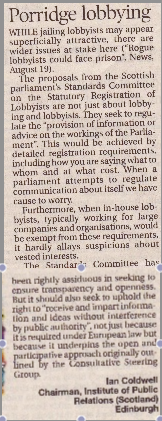
UK / Scotland: Ian Coldwell of the Institute of Public Relations writes in response to the Herald story of the previous week raising the possibility that lobbyists breaching transparency rules could be jailed. He argues that transparency rules would undermine transparency and could be illegal. the Standards committee he states should:
- seek to uphold the right 'to receive and impart information and ideas without interference by public authority', not just because it is required under European law but because it underpins the open and participative approach originally outlined by the Consultative Steering Group.[65]
August 27th
Scotland: Ian Coldwell, chairman of the Institute of Public Relations Scotland argues in The Scotsman:
- The arguments of the Stirling Media Research Institute on the regulation of lobbyists misses one of the central features of the standards committee proposals.
- The proposals go far beyond regulating lobbying as commonly understood. They also aim to regulate the "provision of information or advice about the workings of the parliament". This would be achieved through a complex registration scheme.
- It is at best questionable whether any public body should be allowed to regulate communication about itself. It is all the more worrying that "in-house lobbyists", typically working for large companies and organisations, would be exempt from these requirements.
- Article 10 of the European Convention of Human Rights protects the right to "receive and impart ideas and information without interference of public authority". The committee’s commendable efforts to ensure transparency and openness can surely achieve success without interfering with these rights. [66]
August 29th
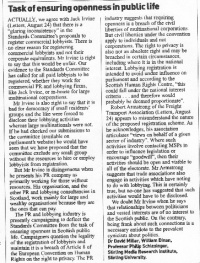
Scotland: Dr David Miller, William Dinan and Professor Philip Schlesinger of the Stirling Media Research Institute write a letter in response to Jack Irvine's letter, Glaring inequality in proposals for lobbyists:
- Actually, we agree with Jack Irvine (Letters, August 24) that there is a "glaring inconsistency" in the Standards Committee's proposals to register commercial lobbyists. There is no clear reason for registering commercial lobbyists and not their corporate equivalents. Mr Irvine is right to say that this would be unfair.
- Our evidence to the Standards Committee has called for all paid lobbyists to be registered, whether they work for commercial PR and lobbying firms, like Jack Irvine, or in-house for large multinational corporations.[67]
August 30th
Scotland: Dr. David Miller, William Dinan and Prof. Philip Schlesinger of the Stirling Media Research Institute write in response to Ian Coldwell (Letters, 27 August, The Scotsman):
- Ian Coldwell (Letters, 27 August) does scant justice to the Standards Committee to regulate lobbyists. These do not interfere in any way with the "provision of information or advice about the workings" of parliament. Just the opposite is true. These proposals would require disclosure of activities involving "information or advice" about parliament, only where payment is involved.
- Lobbyists work to advise clients on how best to approach MSPs and civil servants. The proposal to regulate them does not interfere with such communication. The over-reaction by the PR industry against lobbying registration underlines the need to seek transparency in Scottish political life.[68]
September 1st
Scotland: The Scotsman publishes a letter by Iain D Duff, chief economist and policy manager for the Scottish Council for Development and Industry (SCDI), in response to a letter published by the Stirling Media Research Institute ('Essential to regulate lobbyists', The Scotsman, 22 August 2001):
- I am uncertain as to the evidence on which Dr David Miller, William Dinan and Professor Philip Schlesinger (Letters, 22 August) based their comments on the submission by the Scottish Council for Development and Industry to the standards committee on the regulation of lobbyists.
- Far from the submission being "a rearguard action by vested interests", it is, in fact, a restatement of existing SCDI policy, with added detail. It was first formulated as part of our submission to the consultative steering group in June 1998, which I authored, and is available on the SCDI website.
- It was discussed and ratified by our executive committee, which comprises a cross-section of the broad membership of SCDI.
- The current submission was presented to our board prior to it being sent to the standards committee. SCDI regarded regulation of lobbyists as a bad idea in 1998 and continues to regard it as a bad idea.[69]
September 2nd

Scotland: The Sunday Herald publishes a letter from the SMRI rebutting the arguments of the Institute of Public Relations:
- Contrary to Mr. Ian Coldwell of the Institute of Public Relations, registering lobbyists does not interfere with the right to receive and impart information enshrined in the European Convention on Human Rights (Letters, 26 August).
- It simply requires vested interests to disclose how much money they are paying to influence the decisions of MSPs, and for what purpose. This will not in any way stop vested interests from communicating, but it will afford a sceptical public some knowledge about an otherwise opaque world whose activities affect us all. In fact, we actually agree with the IPR that it would be unfair just to regulate commercial lobbying consultants and to leave completely unregistered those working in-house for large corporations. We have repeatedly said so in our evidence to the Committee.
- The lobbying and PR industries (the IPR included) are currently engaged in a concerted campaign to deflect the Standards Committee from taking an important step in the direction of openness and accountability in line with the high aspirations once held for the Scottish Parliament. It is important for the public interest that the committee stick to its guns.[70]
September 6th
Scotland: The Stirling Media Research Institute (SMRI) issue a response to Iain Duff of the Scottish Council for Development and Industry:
- Iain Duff of the Scottish Council for Development and Industry, (Letters, 1 September), denies there is a rearguard action by vested interests to prevent the Scottish parliament’s standards committee from registering lobbyists. But the evidence is clear.
- The campaign has resulted in a number of articles popping up in the press. All of these interventions sing from the same hymn sheet, raising objections to lobbying registration, which curiously coincide with the interests of those making them.[71]
2002
May 12th
Scotland: Scotland on Sunday report that religious groups are among the most influential growing number of lobbyists in Scotland:
- A network of highly-organised evangelical Christians who spread briefing papers to fellow travellers via the internet and meet discretely with government ministers is rivalling the power of many of Scotland’s elected representatives.
- Devolution has brought Scotland’s churches closer to the centre of power than ever, allowing figures such as the late Cardinal Winning to be credited with diluting Executive plans to repeal Section 28 - but Labour insiders say much was down to the lesser known group Christian Action Research and Education (Care).
- Emulating the Christian right in the US, Care has spent large sums on lobbyists to circumvent the electoral process and put morality firmly on the agenda in all the UK’s parliaments and assemblies: in Edinburgh, London, Cardiff and Belfast. [72]
In another report Scotland on Sunday reported:
- A Scotland on Sunday investigation has established that Christian Action Research and Education (Care), a UK charity with an annual income of 2.4m, has drawn up plans for as many of its members as possible to join mainstream political parties.
- "Last night it led MSPs to accuse the group of trying to "pervert democracy". Care was among the most vigorous opponents of the repeal of Section 28, which banned the promotion of homosexuality in schools.
- The organisation aims to tackle what it regards as Scotland’s "permissive society", including government plans to give greater rights to homosexuals and quicky divorces.[73]
June 24th
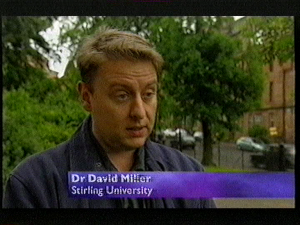
,
USA / Scotland: The Telegraph reported the issue some days later:
- A row has broken out after a Labour backbencher signed a confidentiality agreement with an American drugs firm ahead of a fact-finding trip to the US.
- Margaret Jamieson, MSP for Kilmarnock and Loudoun, agreed to sign the 10-year agreement at the request of pharmaceutical company Pfizer. Shw is making the trip as part of the Scottish Parliament's business exchange programme, which was set up to give MSPs a better understanding of the business community.
- Scottish Socialist MSP Tommy Sheridan has criticised Ms Jamieson, who is deputy convener of the Parliament's health committee, for agreeing to sign the agreement - and for going on the trip to America.
- He said: "It is totally unacceptable for an MSP to sign a 10-year confidentiality clause with a private company. We are here to serve the people of Scotland, not the multinationals.[74]
Scotland: Newsnight Scotland interview David Miller with regards to lobbying at the Scottish parliament.
October 7th
Scotland: Newsnight Scotland reveals that the Scottish Parliament Business Exchange, a scheme which stated that it was 'non-lobbying' had in fact been used by lobbyists. Elaine Thomson MSP was revealed not to have known that the 'lawyer' shadowing her had no legal qualifications, and was in fact a lobbyist working for Saltire Public Affairs, the lobbying subsidiary of law firm Shepherd & Wedderburn.
Here is what she said to Newsnight Scotland:
- Elaine Thomson MSP: One of the things that was done when the inward Parliament programme was organised was that all the names, positions and companies of those involved were all published and was quite open.
- Gordon Brewer (Newsnight): So you were aware that this woman was not a lawyer, but in fact worked for a division of Shepherd and Wedderburn, which from what it says about itself looks very much like a lobbying company?
- ET: It's a company that deals in information and it is the public affairs arm of that company. I mean the individual in question is professionally, as I understand it, a solicitor, though she is currently employed in the public...
- GB: She isn't actually.
- ET: Isn't she?
- GB: We asked the company today and they said she has no legal training.
- ET: Right... I thought she was professionally qualified but obviously I should have read her CV a little more effectively.[75]
October 8th
Scotland: David Miller is interviewed on Good Morning Scotland about the Scottish Parliament Business Exchange.[76]
October 10th
Scotland: Broadcast: David Miller, Interview on the regulation of lobbying at the Scottish Parliament, Scottish Television - The week in politics, 10 October 2002.
October 21
Article of Interest: William Dinan, 'Open Scotlands Executive', Spinwatch, 21 October 2002.
October 27
Scotland: Article of Interest: Dinan, W and Miller, D (2002) 'Called to Account', Sunday Times Scotland, Ecosse Section, 27 October: 2.
November 14th
UK: Broadcast: David Miller, Interview on corporate communication, universities and the public interest, BBC Radio 4 - You and Yours, 14 November 2002.
November 21st
UK: The Eighth Report, ‘Standards of Conduct in the House of Commons’, is published by the Committee on Standards in Public Life.[13]
2003
January 1st
Article of Interest: David Miller, 'Unspinning the globe', Red Pepper magazine, 1 January 2003.
Article of Interest: David Miller, 'Corporate power, institutional corruption', Scottish Left Review, 1 January 2003, p. 6-7.
April 8th
UK: The Ninth Report, ‘Defining the Boundaries within the Executive; Ministers, Special Advisers and the permanent Civil Service’, is published by the Committee on Standards in Public Life.[13]
April 22nd
UK: Sir Alistair Graham takes over as chair of the Committee on Standards in Public Life.[13]
May 27th
UK: Broadcast: David Miller, Interview on media, public opinion and influencing Parliament, Education for schools - BBC, 27 May 2003.
September 8th
UK: The Committee on Standards in Public Life publishes its First Survey Report of public attitudes towards conduct in public life.[13]
September
Scotland: Article of Interest: David Miller, 'Corporate power, institutional corruption' Scottish Left Review, Issue 18, Sept/Oct 2003, p6-7. http://www.scottishleftreview.org/Currentissue/I18DM.htm
November 6th
Article of Interest: David Miller, 'System failure : it's not just the media, it's the whole bloody system', Goldsmiths College, University of London Thursday 6th November 2003.
2004
May
UK: SpinWatch is established ‘by leading journalists and media academics’[77] The group, run by Professor David Miller, Dr. William Dinan, journalist Andy Rowell and Researcher Eveline Lubbers, ‘subjects the PR industry to radical critique from a radical, peace perspective’.[78]
September
Scotland: Article of Interest: David Miller ‘Profit and Parliament’ Scottish Left Review, Issue 24, Sept/Oct 2004: 14-15. http://www.scottishleftreview.org/
Scotland: Article of Interest: David Miller: Taking The Risk Out Of Devolution Scoop, Monday, 6 September 2004, 2:14 am, http://www.scoop.co.nz/mason/stories/HL0409/S00048.htm
November 18-19th
UK / Scotland: SpinWatch and the Public Interest Research Network with the support of the Scottish Left Review held 'a two day research seminar on the topic of spin and corporate power'. According to the CPBF announcement:
- Speakers from Australia, the US, the Netherlands, Germany, Belgium, England and Scotland are taking part. Organisations taking part include Platform, Corporate Europe Observatory, PR Watch, Corporate Watch and leading academic researchers.
Speakers included Bob Burton (PR Watch, Disinfopedia), Aeron Davis (City), William Dinan (CRAG, Spinwatch), Chris Grimshaw (Corporate Watch), Olivier Hoedemann (Corporate Europe Observatory), Eveline Lubbers (Spinwatch), James Marriot (Platform) David Miller (Strathclyde, Spinwatch), Laura Miller (PR Watch, US), Greg Muttit (Platform), Judith Richter (International Baby Food Action Network), Andy Rowell (Journalist, Spinwatch), Leslie Sklair (LSE), Granville Williams (Huddersfield, CPBF)[79]
A report on the conference noted the response of one former New Labour spin doctor:
- Interviewed on Newsnight Scotland, Peter McMahon a former new labour spin doctor dismissed the SpinWatch site and labelled David Miller... a ‘sub-Marxist conspiracy theorist’.[80]
UK: The SpinWatch website (http://www.spinwatch.org) is launched. Receiving a mention in the diary of industry magazine PR Week, the launch was announced as follows:
- Readers beware - self-appointed watchdog and exposer of underhand and deceitful PR practices SpinWatch is getting its communications systems in order. The organisation of academics, journalists and researchers this month launches a website that it promises will 'counter corporate PR and government propaganda'.[81]
However, PR Week wonders if SpinWatch itself is practising a little bit of media manipulation to maximise its buzz:
- In what seems like a contradiction, SpinWatch is 'launching' a website that it claims is already receiving 400 hits a day from people in 70 countries and has been live for more than a month. Surely controlling the timing and flow of information is a central allegation levelled at PROs? Perhaps the website's 'launch' is being used as a means to promote its latest conference, major reports and SpinWatch expose, details of which fill the vast majority of the launch press release.[81]
2005
January 19th
UK: The Tenth Report, ‘Getting the Balance Right – Implementing Standards of Conduct in Public Life’, is published by the Committee on Standards in Public Life.[13]
March
EU: European Commission Vice President Siim Kallas launches the European Transparency Initiative (ETI). During his speech at the launch of the ETI in Nottingham, Kallas himself remarks that ‘Lobbyists can have considerable influence on legislation, in particular on proposals of a technical nature... But their transparency is too deficient in comparison to the impact of their activities’.[82]
March 14th
Article of Interest: David Miller, 'The age of the fake', Spinwatch, 14 March 2005.
April 7th-8th
Scotland / EU: David Miller and William Dinan co-convened with Corporate Europe Observatory an international networking meeting on the European Transparency Initiative at in Brussels titled 'Curbing corporate power over EU policy-making'. Dinan and Miller gave a paper titled: ‘Lessons from the campaign to register lobbyists in Scotland’ at the seminar at Scotland House, Rond-Point Schuman in Brussels.
April 27th
EU: David Miller and William Dinan wrote to Siim Kallas, vice-president of the EU Commission on the 27 April regarding the European Transparency Initiative.[83] The full letter can be viewed here.
May
EU: The ETI is formally debated by EU Commissioners.


Friday 1 July
Scotland: SpinWatch organises a ‘SpinWalk’ in Edinburgh to ‘shine a light on the activities’ of corporate Scotland. Inviting anti-spin activists to ‘know your enemy more effectively’, the tour takes in ‘lobbying consultancies and PR outfits working incessantly to boost corporate power’.
SpinWatch stated that the:
- 'SpinWalk' will visit those oil companies, banks and businesses profiteering from privatisation and PPP in Global South countries, as well as the key lobbying consultancies and PR outfits who help boost corporate power and wealth. Starting at the Usher Hall, the walk will end at the Scottish Parliament "around which the corporate lobbyists swarm to ensure that Jack McConnell and his cronies are kept sweet".[85]
The PR Week Diary reported that:
- PR folk in Edinburgh are on edge this week, with industry critic SpinWatch planning a 'SpinWalk' today (1 July) to 'shine a light on the activities' of corporate Scotland.
- SpinWatch, which also hosted a guided tour of agencies in London last autumn, is inviting anti-spin activists to 'know your enemy more effectively' by mustering at Usher Hall in advance of a tour of 'lobbying consultancies and PR outfits working incessantly to boost corporate power'. Gulp.
- Of course, police are already on standby in the city to deal with any civil disturbances that may accompany the somewhat higher-profile marchers set to descend on Edinburgh to raise awareness of global poverty this weekend.
- One PR man in the city tells us: 'A lot of companies have taken on extra security for the G8 thing. These "anti-spin" campaigners will probably be mistaken for outright anarchists - they may well end up in a cell.'
- Suggesting SpinWatch's activists use their time 'more productively', our hero declares, with no hint of a tremble: 'Surely there are far more deserving culprits for their ire than us?' Surely there are, but perhaps best batten down the hatches anyway, just in case.[84]
Sunday 3 July
Scotland: The G8 Alternatives Counter Summit was held in Edinburgh at venues across the city the day after the Make Poverty History march. SpinWatch played a leading role in organising the Counter-Summit.

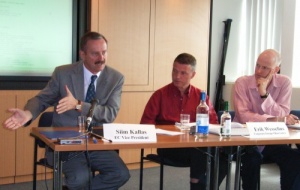
July 19th
EU: The Alliance for Lobbying Transparency and Ethics Regulation in Europe (ALTER-EU) is established. ALTER-EU is a pan-European civil society organisation representing a diverse range of over 160 organisations whose shared interest is in transparency as a first step to a more democratic and accountable EU. The Alliance emerged out of a pre-existing campaign set up to tackle environmental and developmental externalities of EU trade policy.[87] ALTER-EU is coordinated by a Steering Committee which currently has the following members: Paul de Clerck (Friends of the Earth Europe); William Dinan (Strathclyde University & SpinWatch); Marc Gruber (European Federation of Journalists); Yveline Nicolas (Adéquations); Ulrich Müller (LobbyControl); Jorgo Riss (Greenpeace European Unit); and Erik Wesselius (Corporate Europe Observatory).[88] ALTER-EU members groups are themselves expected to practice ‘unilateral transparency’ as they campaign for ‘EU lobbying disclosure legislation’; ‘enforceable ethics rules for lobbyists (for instance prohibiting employment of officials or their relatives for lobbying purposes’; and ‘an improved code of conduct for European Commission officials’. The coalition has led the European debate on the European Transparency Initiative (ETI) and the need for lobbying disclosure and regulation of ethical standards.[88]
November
November 9th
EU: The European Transparency Initiatuve (ETI) is formally adopted by the European Commission.[89]
November 10th
UK: It emerges that Labour MP David Blunkett was paid £15,000 by APPC members Weber Shandwick to speak at a dinner hosted by the agency. The APPC code states that it is against the rules for their members to ‘make any award or payment to any MP, MEP or sitting peer’. However, while the lobbying arm of Weber Shandwick is a member of the APPC, its corporate practice - which paid for Blunkett to speak - is not, and therefore the rules were not officially breached. This prompted the APPC to review their code and address ‘the grey area’ regarding member agencies which are part of large PR groups. Weber Shandwick CEO Colin Byrne defended the payment, saying ‘There is nothing wrong with MPs being paid for after-dinner speeches if they abide by parliamentary rules’.[90]
2006
March 26th
Article of Interest: David Miller, 'Nuclear view: spin doctor defends lying', 26 March 2006.
May 3rd
EU: The European Transparency Initiative (ETI) Green Paper is published. The paper states:
- With the European Transparency Initiative, the Commission has launched a review of its overall approach to transparency. The aim is to identify and stimulate a debate on areas for improvement. Consequently, the Initiative covers a broad spectrum of issues. These range from fuller information about management and use of Community funds to professional ethics in the European institutions and the framework in which lobby groups and civil society organisations are operating.[91]
May 21-22
Scotland: Scotland: Neoliberal Scotland?: Rethinking Scotland in the global context conference organised by the Department of Geography & Sociology, University of Strathclyde. Glasgow, 21st to 22nd May 2006. The call for papers noted:
- 2006 marks seven years since the creation of the Scottish parliament. With the 'seven year itch' in mind we suggest that the time is ripe for beginning a period of critical reflection. The devolution settlement seemingly not only represented the 'settled will' of the Scottish people but was also the central mechanism through which 'Scottish solutions' for 'Scottish problems' were to be delivered...
- Whilst we would welcome a broad range of views and approaches, it is recognised that there has been a distinct lack of critical appraisal of the rhetoric of de-centralised decision making in relation to the reality brought about by an increasingly pervasive underpinning neo-liberal ideology. Thus it is intended to explore through debate and theoretical and empirical analysis key aspects of Scottish life in a holistic way...
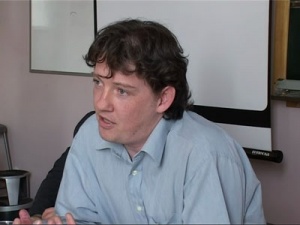
- Among the questions that face us are:
- Is Scotland distinctive or merely a local outpost of neo-liberal globalisation?
- Has social democracy survived in Scotland or is neoliberalism in the ascendant?
- What mechanisms are being used to embed market processes in the public sector?
- Can environmental justice be achieved in Scotland?
- How can privatisation and marketisation of public services be resisted?
- Is sectarianism the same as racism? Does it persist?
- How does Scotland respond to asylum and migration; What should be done?[92]
August
EU: Consultation. (ETI) Spinwatch submits evidence to the consultation. [93] A full transcript of the evidence is available here.
September 12th
UK: The Committee on Standards in Public Life publishes its Second Survey Report of public attitudes towards conduct in public life.[13]
September 18th
EU: On the back of the May 2006 Green book on European Transparency Initiative (ETI), launched by Commissioner Siim Kallas, an expert hearing entitled 'Lobbying - transparent?' is held by the European Parliament. The aim of the initiative is to:
- contribute to the increase of openness and accessibility of EU institutions, to raise awareness over the use of the EU budget and make the Union’s institutions more accountable to the public. One particular focus of the debate surrounding the ETI is lobbying transparency. In view of the EP work ahead, this hearing shall allow to MEPs to receive and consider expert opinions from different perspectives on that particular issue.[94]
Those in attendence included Commissioner Siim Kallas - European Commission; Dr William Dinan - University of Strathclyde - Scotland / ALTER-EU; Gaël du Bouëtiez- Manager of European Intermediation and member of the board the Society of European Affairs Professionals (SEAP); Elodie Fazi - Coordinator, Civil Society Contact Group & Craig Holman, Ph.D. - Capitol Hill lobbyist - US / Public Citizen.[94]
November 2nd
Article of Interest: David Miller, 'A declaration of interest', Spinwatch, 2 November 2006.
20-21 November
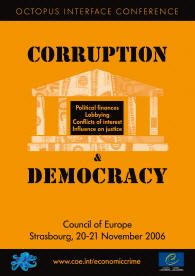
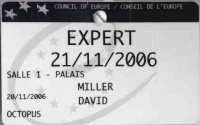
EU: The Council of Europe held a conference on 'Corruption and Democracy' which examined:
- Political finance
- Lobbying
- Conflicts of interest
- Corruption, justice and democracy
The meeting was opened by Guy De Vel (Director General of Legal Affairs of the Council of Europe), and addressed by Siim Kallas (Vice-President of the European Commission), Mikhael Grishankov (Chairman of the Anti-corruption Commission of the State Duma of the Russian Federation), Piero Grasso (National Anti-Mafia Prosecutor of Italy) and other speakers.[95] Presentations were later published in a book with three chapters on lobbying by Siim Kallas of the commission, lobbyist Rogier Chorus and academics David Miller and William Dinan.[96]
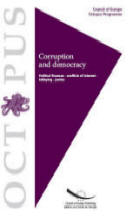
20 December 2006
EU: Letter to William Dinan from J Aguiar Machado on behalf of EU commissioner Peter Mandelson, in relation to a complaint about a European Services Forum meeting, 20 December 2006.
2007
USA: In the U.S.A., the Honest Leadership and Open Government Act comes into force. As a result, it is possible for anyone using a quick internet search to find out ‘who is lobbying whom, how much they are being paid, and whom they represent’.[97]
UK: The publication of a new ministerial code drops the requirement for meetings between ministers and lobbyists to be recorded.[97]
January 18th
UK: The Eleventh Report, ‘Review of the Electoral Commission’, is published by the Committee on Standards in Public Life.[13]
March
UK: The APPC is again forced to ‘tighten up’ its Code of Conduct. Although disclosure of clients and consultants is a condition of APPC membership, the original code of conduct failed to include a clear requirement for this information. Gill Morris, then association chair of the APPC, remarks that ‘This is an important development for the APPC and will promote greater transparency and clarity in the PA sector’. The changes were made after it emerged that lobbying firms were assuring potential clients that they adhere to the code - without actually being members of the APPC itself. The alarm was raised by Labour MP John Grogan, who later published an Early Day Motion (EDM) on lobbying, when he discovered that non-APPC agencies were telling clients that they adhere to the code, without being prepared to disclose their list of clients. Several recent tenders for consultancy firms had required adherence to the code, but not membership of the APPC, such that Bell Pottinger Public Affairs (at that point not registered with the APPC) was able to compete with Connect Public Affairs (a member) for its account with Thames Gateway London Partnership, on the grounds that both agencies followed the general principles set out in the code.[98]
March 18th
UK: Golden Arrow Communications (non-APPC) scandal: The Sunday Times revealed they had secretly recorded Golden Arrow lobbyists Ivan Henderson, a former Labour MP and David Jamieson, a former transport minister claiming that two government ministers, Stephan Ladyman and Gerry Sutcliffe were helping their business. The Sunday Times article stated:
- The lobbyists claimed Sutcliffe was prepared to hand over his private Whitehall diary to them, while Ladyman was claimed to have divulged information on policies such as road-charging. Their close relationship with Golden Arrow Communications, a London-based lobbying firm, was witnessed by an undercover reporter working for the firm.[99]
March 21st
EU: The European Commission publishes proposals for a voluntary register:
- It was suggested that a new voluntary register for lobbyists and a draft conduct was to be created, the consultation standards to be reinforced and the process towards publishing the beneficiaries of EU funds should be pursued.[100]
April 27th
UK: Rita Donaghy CBE takes over as interim chair of the Committee on Standards in Public Life.[13]
June 27th
UK: The Public Administration Committee 'today launches its inquiry into the lobbying industry. The Committee is calling for interested organisations and individuals to submit evidence to the inquiry.':
- The inquiry will be the first Parliamentary inquiry on lobbying since the 1991 report from the Select Committee on Members’ interests. In the intervening years, lobbying has been at the centre of political scandals. The cash for questions affair, amongst others, tarnished the word with the stain of sleaze. The industry responded by introducing an element of self-regulation and encouraging professionalisation of its work, but lobbying is still viewed with suspicion in some quarters.
- The inquiry will consider questions such as whether the lobbying industry requires external regulation, as has been the case in the United States for some time, and how the Government should interact with lobbyists. The Committee may also consider issues such as “cash for access” and the funding of All Party Groups by lobby firms.[101]
September 7-9
Scotland: Lobbying was among the topics discussed at a conference at Strathclyde University: Communication and Conflict: Propaganda, Spin and Lobbying (Glasgow, 7-9 September, 2007). The conference announcement stated:
- Propaganda, spin and lobbying are increasingly the topic of public and media debate. From the attempt to construct a 'threat' from Weapons of Mass Destruction, through the razzmatazz of political campaigning to the regular scandals about improper corporate influence on policy the relationship between communication, conflict and power is back on the academic research agenda.
- The conference will be an international gathering of leading experts and researchers in the area of propaganda, spin, lobbying, media management and investigative journalism. It will also feature hands on sessions on how to investigate propaganda and lobbying activities, led by SpinWatch.[102]
The Lobbying Roundtable briefing paper can be viewed here.
The Lobbying Roundtable summary paper can be viewed here.
2008
January 1st
UK: Sir Christopher Kelly becomes the new chair of the Committee on Standards in Public Life.[13]
January
UK: The Second Session of the Public Administration Select Committee (PASC) inquiry involves the submission from evidence by SpinWatch and Unlock Democracy. David Miller of SpinWatch told the MPs:
- It's clear that it is the democratic right of every interest in society to be able to access decision-makers and petition them, but it's also clear that in a democracy there ought to be some sort of level playing field.[103]
His colleague William Dinan said: 'The public have a right to know who is trying to influence policy.' However, Labour MP and committee chair Tony Wright claimed 'You don't need regulation unless there's a problem; arguing that it is not possible to 'read across the problems in one political culture to another'. Labour MP Julie Morgan remarked 'There's a real danger that you're stifling democracy with these suggestions.' Similarly, Liberal Democrat Jenny Willot suggested that the campaigners 'might be over-estimating the influence of lobbyists on MPs.' In what Singleton (2008) describes as ‘the most scathing attack’, Conservative Charles Walker said ‘You're creating a concern that simply doesn't exist’; concluding 'You're conspiracy theorists... You think there's a conspiracy on behalf of big business to corrupt democratic systems.'[103]
February 1st
UK: On 1st February, PR Week reports that ‘according to lobbyists who were following the spectacle’, campaigners calling for stringent regulation of the lobbying industry during the select committee inquiry ‘failed to win over MPs’. Immediate past president of the CIPR, Lionel Zetter, claims:
- Most members of the committee seemed to feel that the type of elaborate regulatory regime that they are advocating would be inappropriate and unnecessary in the UK.
The article concludes saying ‘the campaigners did get some support from Labour MPs Kelvin Hopkins and David Heyes’.[103]
May
EU: European Parliament plenary vote on the Stubb Report – mandatory, finance and names.
June
June 28th
UK: The Independent carries a front page story exposing how a senior arms lobbyist gained access to Parliament and ministers. The article states:
- A senior arms lobbyist is gaining access to ministers, MPs and peers inside Parliament using a research assistant pass allotted to a member of the House of Lords who benefits financially from one of his companies, The Independent has learnt.
- Robin Ashby, who is chairman of a defence consultancy firm that offers to ask questions of government on behalf of its clients "without your fingerprint being evident", includes among his acquaintances the Defence Secretary, the Chancellor and the Chief Whip.
- Mr Ashby's firm, Bergmans, lobbies on behalf of more than a dozen large defence and aerospace companies including BAE Systems, Northern Defence Industries, UK Defence Forum, Boeing and Rolls-Royce, which has been criticised for its past links to the Burmese regime.[104]
July
EU: European Commission register launched.
EU: Spinwatch publish the report 'Too Close for Comfort? A report on MEPs, corporate links and potential conflicts of interest'. From the Executive Summary:
- Too Close for Comfort? is an investigation into the potential conflicts of interest arising from the activities of some Members of the European Parliament (MEP), their commercial interests and links to business lobby groups. It profiles twelve MEPs whose activities illustrate these potential conflicts. They have been selected because their activities are representative of the issues, not because their behaviour is deemed extraordinary.[105]
The full report is available in pdf format here.
September 22nd

UK: The Alliance for Lobbying Transparency organised 'Will Lobbyists Come Clean?' a debate on ethics and transparency in lobbying held as a Public fringe event at the Labour Party conference 2008. On the panel were John Grogan MP; Prof David Miller, Director of SpinWatch, a member of the Alliance for Lobbying Transparency; Jon McLeod, Chairman, UK Public Affairs at Weber Shandwick; Stephen Kingston, Editor of the Salford Star, an award-winning, grassroots magazine; Chair: Nigel Pivaro, formerly played Terry Duckworth in Coronation Street, and is now a journalist. According to the Public Affairs News report of the event: 'An impassioned shouting match flared between the Association of Professional Political Consultants’ (APPC) top brass and self-proclaimed transparency campaigners at the Labour Party conference.'[106] PAN noted what it called the 'provocatively titled' ‘Will lobbyists come clean?’ and reported that the debate 'saw audience members including APPC chairman Robbie MacDuff hitting back at arguments put forward from panellists – chiefly SpinWatch’s Prof David Miller – as to why lobbyists should be more tightly regulated.'[106]
In addition to MacDuff 'APPC management board members Warwick Smith and Darren Caplan, who were all in the audience, defended self-regulation.' The report continued:
- ALT’s fringe was chaired by journalist/actor Nigel Pivaro, best known for playing Terry Duckworth in the ITV show Coronation Street. Pivaro lived up to his soap character’s feisty demeanor, at one point provoking MacDuff and his APPC colleagues by saying “Your industry is involved in a lot of shenanigans.”
- MacDuff, in particular, took such exception to this and similar comments, taking to his feet to hit out at “Daily Mail generalisations”...
- Piping up from the back row of the ALT fringe in a show of solidarity with MacDuff, fellow APPC loyalist Warwick Smith told the room: “Statutory regulation may not work better than self-regulation. With statutory regulation people try and find ways around it.” He said financial disclosure was likely to lead to “voyeurism”.
- Miller shook his head as MacDuff argued that to create a parliamentary register would create a barrier to entry to those seeking to lobby. MacDuff said: “We should shine a light onto law firms, accountancy firms, organisations of dubious purpose, rather than increasing red tape [for organisations such as APPC members].”
- Jon McLeod, UK PA chairman at Weber Shandwick – an APPC member agency – was one of the panellists at the fringe. McLeod said his US colleagues had observed that financial disclosure could lead to a “financial arms race” in which competing interests ramp up their lobbying spend when they see what the other side is spending.
- McLeod said self-regulation was “working well” and pointed out that the APPC’s self-regulatory code of conduct “doesn’t stand still”. MacDuff chimed in to describe the APPC’s disciplinary procedures as “very robust”.
- Miller wondered why organisations queue up to hire people from government roles. MacDuff responded by describing the idea that people trade on their access as “redundant”.
- John Grogan MP, who led parliamentary interest in transparency in lobbying last year, was also one of the fringe panellists, as was Stephen Kingston, editor of local paper the Salford Star. Clearly a critic of corporate power, Kingston said it was “absolutely frightening as to how big companies are in the driving seat on regeneration”.
- McLeod, seated next to Kingston on the panel, defended the use – and integrity – of ‘community consultations’ in general. The WS man was then asked directly by Kingston whether he would work for “the Salford community” for free, to which McLeod replied “yes”.
- Looking back on the debate a few days afterwards, McLeod told PAN he “was arranging to see Stephen in Salford”. As to the rowdy scenes, McLeod said: “I think we need to be less confrontational towards our critics and educate them about what public affairs is.”[106]
Spinwatch launched a guide to the lobbying industry at the event. The booklet:
- documents the tactics used by leading PR and public affairs companies on issues such as nuclear power, science, food and local government. It then takes you on a tour of leading PR companies, think tanks and corporate funded science organizations in the UK.
- Spinning the Wheels also gives an insight into lobbying, a sub-sector of the PR industry. It argues that while lobbying is a legitimate activity, the majority is undertaken by or on behalf of industry. By examining the links between personnel in commercial lobbying consultancies and politics in the UK, it reveals the enormous disparity in access and influence between the business interests able to afford their services and those lobbying in the not-for-profit sector.[107]
October 9th
UK: The Committee on Standards in Public Life publishes its Third Survey into public attitudes towards conduct in public life.[13]
November 5th
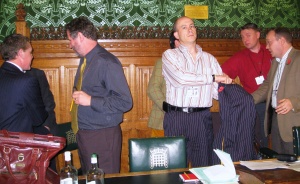
UK: The Alliance for Lobbying Transparency organised a debate in the House of Commons: 'Averting the Next Crisis: Why transparency in lobbying matters'. Chaired by David Hencke, Westminster correspondent, The Guardian, other speakers were Robbie MacDuff, Chair, Association of Professional Political Consultants, Robert Siddall, CEO, Airport Operators Association, Peter Facey, Director, Unlock Democracy and Guido Fawkes, prominent Westminster blogger.
According to a report of the meeting by former BBC journalist Nick Jones:
- Self regulation for political lobbying is currently the only show in town but the demand that lobbyists should be allowed to continue policing themselves was blown to bits at a Guy Fawkes’ night debate at the Houses of Parliament.
- Robbie MacDuff, chair of the Association of Professional Political Consultants, was assailed from all sides when he insisted that the “self-regulatory system works well and is seen to be working well”.
- The furthest MacDuff went to acknowledge the widespread disquiet was to promise that the APPC would keep its voluntary code of conduct under review and strengthen it if necessary.[108]
Jones went on to report MacDuff's attempts to defend the industry:
- MacDuff insisted that the eighty five per cent of lobbyists who were in the APPC were transparent: they registered all their clients on a quarterly basis and had no financial relationships with Mps or peers whereas charities and other organisations had access to Westminster and did not declare their sources of finance.
- He tried to counter the criticism by arguing that the APPC’s disciplinary procedures were “pretty rigorous” but they would continue to review them. “If you work as a private sector lobbyist your reputation is shot to pieces when you are exposed in the media for inappropriate behaviour and you lose clients… We try to promote the validity of lobbying which were think is legal”.
- MacDuff had effectively thrown down the gauntlet: while awaiting a report from the House of Commons Public Administration Committee into alleged abuses by the lobbying industry, the only course of action left open to campaigners for greater transparency was to accept his advice and help the news media to do more to expose the “inappropriate behaviour” of lobbyists.[108]
December
From December 2008 until April 2009, the IIWG.
December 9th

EU: The 2008 Worst EU Lobbying Awards ceremony was held at Le Bouche a Oreille, Brussels 9 December 2008. Organised by Lobbycontrol, Corporate Europe Observatory, Friends of the Earth Europe and Spinwatch, the results were as follows:
- The winners of the 2008 Worst EU Lobbying Awards have been revealed at a ceremony in Brussels today, despite a last minute attempt to gag the organisers with legal action from one of the candidates. More than 8500 people took part in the online public vote.
- One of the candidates for the Worst Conflict of Interest Award, suspended Commission official Fritz-Harald Wenig, unsuccessfully tried to silence the Worst EU Lobbying Awards last week by taking legal action in the Court of First Instance in Brussels to have his name removed from the nominations and not have his name mentioned during the Worst Lobbying Awards ceremony. The court ruled that freedom of speech was more important in this case.
- This year's Award for the Worst EU Lobbying 2008, with more than 50% of the votes, goes to a joint nomination for the agrofuel lobbyists, the Malaysian Palm Oil Council, Brazilian sugar barons UNICA and energy company Abengoa Bioenergy for their use of misleading information and greenwash. The lobbyists tried to influence crucial debates in the European Parliament and Council by claiming that agrofuels (crops used for fuel for cars and lorries) are sustainable.
- The Worst Conflict of Interest Award 2008 goes to the Finnish MEP Piia-Noora Kauppi, with 26% of the votes cast. MEP Kauppi has been promoting the interests of her future employer, a banking lobbying group, while still an active member of the European Parliament. Kauppi has consistently urged light-touch regulation for the banking sector and in January 2009 will officially be employed by the Federation of Finnish Financial Services.[109]
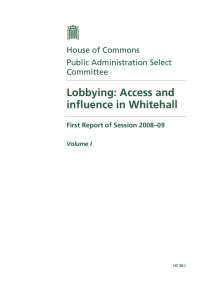

2009
January 5th
UK: The Public Administration Select Committee (PASC) of the House of Commons publishes its report Lobbying: Access and Influence in Whitehall, recommending the introduction of measures which would ‘promote ethical behaviour by lobbyists’, ensure ‘the maximum reasonable degree of transparency’ in the process of lobbying, and make it more difficult for politicians and public servants to use information or contacts built up during their time in office ‘as an inducement to other potential employers’. Although the Committee ‘do not believe that transparency requirements are ever likely to be enforceable through self-regulation’, they suggest that there could be ‘a role for a self-regulatory organisation in promoting ethical behaviour by those involved in lobbying’. For the current situation of self-regulation to be made more effective, PASC recommended the establishment of ‘a single umbrella organisation with both corporate and individual membership, in order to be able to cover all those who are involved in lobbying as a substantial part of their work’. Furthermore, the running of the organisation should involve individuals from outside lobbying; with a clear separation between the promotion, representation and regulation of lobbying; and the introduction of more rigorous scrutiny and external validation.[110] The UK Public Affairs Committee (UK PAC) is conceived as a response to the PASC recommendations.[111]
January 27th

UK: The Alliance for Lobbying Transparency (ALT) launches its campaign in parliament ‘for the public scrutiny of the contacts between legislators and professional hustlers’ (Monbiot, 2009). Monbiot (2009) argues that this launch comes ‘with impeccable timing’:
- There's a major lobbying scandal about once a month, and no one who is aware of the government's failure to regulate this industry should be surprised. It was elected to stamp out sleaze, but since 1997 has done almost nothing.
Paul Flynn MP, one of the members of the Public Administration Select Committee who unanimously approved the call for statutory regulation of lobbyists notes Monbiot's comments on his blog and states that the views of the Alliance for Lobbying Transparency:
- greatly influenced PASC's called for a mandatory registration of all lobbyists and publications of their diaries. The lobbyists howled in rage at PASC's report. Proof enough that we had hit the spot.[112]
January 29th
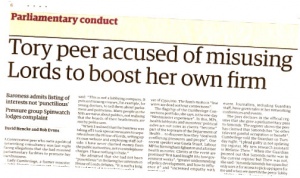
UK: The Guardian report that a Tory peer, Lady Cumberlege, allegedly used the House of Lords to boost her own firm:
- A Conservative peer who owns a political networking consultancy was last night facing allegations that she had misused parliamentary facilities to promote her own business.
- Lady Cumberlege, a former minister in John Major's government, yesterday admitted failing to declare "punctiliously" her financial interests during House of Lords debates.
- The peer's firm, Cumberlege Connections, runs courses and conferences in which clients involved in healthcare pay to learn more about how Westminister and Whitehall operates. The firm says it "works extensively with the NHS, regulatory organisations and the pharmaceutical industry".
- Cumberlege faces further allegations about the use of a Lords email address to recruit people to commercial courses her firm was organising, and about giving her business partner a Lords access pass.
- She also faces allegations of failing to declare her business partner's financial interests in an official anti-sleaze register. Under the Lords' rules, anyone given a parliamentary pass must declare any employment or financial interest in a business involved in lobbying.[113]
Spinwatch, who uncovered the Cumberledge case, stated they would lodge a complaint with the panel of peers over the issue:
- Spinwatch's spokesman, David Miller, said : "No peer should be treating parliament as an office from which to do commercial business, and we will be making a complaint to the relevant authority. The fact that we don't know who Cumberlege's clients are – especially commercial health companies – is also a concern and underlines the fundamental need for greater transparency."[113]
January 31st
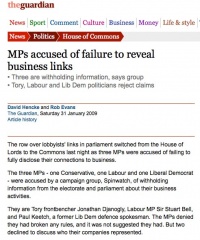
UK: Spinwatch accuses three MPs of withholding business related information from the electorate and parliament. The Guardian reports:
- The row over lobbyists' links in parliament switched from the House of Lords to the Commons last night as three MPs were accused of failing to fully disclose their connections to business.
- The three MPs - one Conservative, one Labour and one Liberal Democrat - were accused by a campaign group, Spinwatch, of withholding information from the electorate and parliament about their business activities. [114]

UK: The Daily Mail report that some peers from the House of Lords are offering their services as conference and after-dinner speakers for up to £25,000. The Daily Mail reports:
- But because of a loophole in the law, the Lords do not have to declare how much they make from socialising with bankers, industrialists and other professionals.
- By contrast, MPs are forced to reveal any income above £630 they receive from speaking engagements in a single year.
- Research by the Mail has uncovered 18 peers advertising their services on websites for after-dinner speakers.
- However, only three of them declare these commercial activities on their Register of Interests.[115]
February
UK:Full-page advertisement for the ALT published in The Times. Headed 'Parliamentary Access' the with strap line 'putting the cash into politics' the ad stated: 'Don't let cumbersome democracy get you down. Buy yourself influence with Parliamentary Access'. The ad urged people to ask their MP to support the 'introduction of a mandatory register of lobbying activity'.
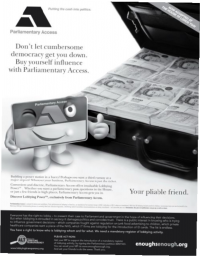
EU: The report 'Would you bank on them? Why we shouldn’t trust the EU’s financial “wise men”' is published by the Corporate Europe Observatory (CEO). From the reports Executive Summary:
- In the EU, the Commission and the Council has set up a High Level Group of eight experts to advise them on how to reform the financial system in terms of supervision and regulation. Given the now obvious failings of the current system and individual financial sector institutions, it would seem prudent to seek advice from a diversity of sources, including from independent experts who had expressed concern about the flaws in the current financial architecture.
- However, the group - named the de Larosière Group after its chairman - is comprised of people closely linked to the financial industry, or to institutions that, to a greater or lesser extent, have been implicated in the crisis.[116]
The full report may be downloaded in pdf format here.
April
EU: Joint EP-EC register ‘portal’
May
UK: 38 Degrees – named after the angle at which an avalanche happens - is launched with their campaign for a Recall Law. Inspired by similar campaigning movements such as the US-based MoveOn.org and global campaigners Avaaz.org, 38 Degrees aim to use the latest technologies to allow the public to take effective action as part of ongoing campaigns.[117]
UK: SpinProfiles (later called Powerbase) is launched by Spinwatch in May 2009. It aims to catalogue organisations and individuals involved in managing public debate.
May 25th

North America / EU: The European Union Center of Excellence at the University de Montreal hold a transatlantic workshop entitled 'Regulating Ethics and Lobbying: What Can Europe And North America Learn from Each Other?'. The selected speakers and subjects were:
European Perspectives on Ethics Regulation and Lobbying
- Thomas Henökl, European Institute of Public Administration, The Netherlands: Regulating Conflicts of Interest: Comparative Study of the Rules and Standards of Professional Ethics for Holders of Public Office in the EU 27
- William Dinan, Department of Sociology, University of Stratchclyde, spoke-person for ALTER-EU (Alliance for Transparency and Ethics Regulation): Bursting the Bubble: Lobbying transparency and regulation in Europe
North American Experiences
- André C. Côté, Commissaire au lobbying du Québec
- Andrew Stark, Rotman School of Management, University of Toronto: The Ethics of Lobbying in America: Some New Gray Areas
- Pierre Ricard-Desjardins, Office of the Commissioner of Lobbying of Canada: The Canadian Lobbying Act
Transatlantic Comparisons
- Christine Mahoney, Political Science, Syracuse University: Brussels versus the Beltway: Corporate Lobbying Influence in the US and the EU
- Craig Holman, Government Affairs Lobbyist, Public Citizen, Washington: Lobbying Reform in the United States and the European Union: An Attitudinal Survey of the Progress on Two Continents[118]
June
UK: The National Council for Voluntary Organisations (NCVO) dismisses UK PAC's proposals for a self-regulating lobby register; citing the fact that charities are different from organisations in the private sector and already regulated by the Charity Commission. The NCVO is, however, supportive of government proposals for a statutory register; proposals which are themselves to be based on the work of UK PAC. Chloe Stables, Parliamentary Officer of the NCVO, states that the NCVO will continue to work with UK PAC ‘to show how its register would impact on the Government's own plans, and now we will continue to work with it as it takes forward a statutory register’. Leigh Daynes, Plan UK Director of Communications, disagrees with the position of the NCVO, stating ‘I'm not sure how a register would work, and we do have umbrella organisations such as NCVO, so we would want to avoid duplication and waste’.[119]
July 2nd
UK: Six months after the publication of its long-awaited report into lobbying, the PASC holds a session with representatives from the APPC, PRCA and CIPR Government Affairs Group (GAG) at Portcullis House, Westminster; in a move which Hall (2009) suggests ‘is being interpreted by industry observers as a sign from the committee… that its members are getting fed up with waiting and want a government response sooner rather than later’. Also invited to attend are a representative of the ‘Public Affairs Council Working Party’ and representatives from the Alliance for Lobbying Transparency (ALT), Unlock Democracy and Friends of the Earth.[120]
August 9th

UK: The Times reveals that "50 prospective candidates chosen by the main parties are already working as lobbyists and public relations executives and are deeply enmeshed in the world of spin and politics."[121]
September
UK: The shadow minister for the Cabinet Office, Conservative MP Francis Maude, declares that lobbying firms should publish their client lists and details of their full- and part-time staff, warning that ‘If the industry fails to self-regulate, it should be prepared for legislation that will ensure greater accountability’.[122] Responding to these threats about the possible future introduction of tougher legislation, chair of the APPC Robbie MacDuff remarks:
- I think Maude's comments have been noted by a significant group of lobbyists outside of self-regulation at the moment. Sometimes it takes this kind of political interest to move forward those who have been resistant to taking seriously issues around accountability, transparency and openness.[122]
SpinWatch spokesperson David Miller comments ‘We are a bit sceptical about the plans. We think this is the Tories being soft on lobbyists’.
Director of DLA Piper, Eben Black, welcomes additional Tory pronouncements on amending the solicitors’ code of conduct allowing solicitors’ firms that engage in lobbying to disclose their lobbying clients without breaching the code. Black remarks ‘We have been calling consistently for a statutory register’.[122]
October
UK: The government dismisses the PASC recommendations for a statutory register, arguing that the industry should be allowed to self-regulate. The government did accept the recommendation that all departments publish online quarterly reports outlining the details of ministerial meetings with external groups and hospitality received by ministers and advisers; and an extension to the list of civil servants required to publish details of their own hospitality and expenses details. However, the suggestion that details of meetings between officials and external groups should be published was rejected; and the government failed to suggest a timeframe within which the efficacy of industry self-regulation will be assessed.[123] PASC’s chair, Dr Tony Wright MP, remarked that he was disappointed that the government had dismissed the idea of a statutory register; but maintained ‘this is where I think we will eventually end up’. Suggesting that ‘self-regulation is no regulation’, David Miller of the Alliance for Lobbying Transparency commented that asking the public to trust lobbyists to operate transparently is akin to ‘asking us to trust MPs on expenses’. He added:
- The government has dropped the ball on political reform and ignored public concerns by refusing to force lobbyists to operate in the open. In June, Gordon Brown said that the future was about opening up areas of public life that have been too secretive. This must include the massive and growing influence commercial lobbying has on public life.[123]
November

EU: ALTER EU publishes a report entitled 'A Captive Commission: the role of the financial industry in shaping EU regulation'
UK: The Twelfth Report, ‘MPs' expenses and allowances: Supporting Parliament, safeguarding the taxpayer’, of the Committee on Standards in Public Life is published.[13] Sir Philip Mawer - who from 2002 until 2008 was parliamentary commissioner for standards - agrees to chair an ‘implementation team’ for the new umbrella body UKPAC.[124]
EU/International: ALTER EU submits evidence to the OECD consultation on the 'Draft Principles fro Transparency and Integrity in Lobbying'.[125]
The document nods to the experience in the EU and in Scotland and the UK:
- We note that the OECD draft principles were ‘developed in parallel with the Green Paper of the European Transparency Initiative and the Code of Conduct for Interest Representatives developed by the European Commission’. ALTER EU’s response to the draft principles is informed by our active role in the ongoing debate in Brussels on the European Transparency Initiative. Our response also draws upon lessons we have taken from our member organisations across the EU on the challenges of making lobbying more transparent and accountable.[125]
It concludes that voluntary approaches to lobbying regulation are untenable:
- One can only conclude that there remain serious problems in relation to lobbying transparency: the mismatch between public perceptions of lobbying (i.e. that there are frequent problems and instances of inappropriate lobbying) and self-regulatory oversight (i.e. there are hardly ever any problems with lobbying) suggests that independent and verifiable means of assessing lobbying processes and practices are urgently required.[125]
The full document of ALTER EU's response is available here.
December 15

Naomi Klein presents the Angry Mermaid Awards 2009. The 'winner' of the 2009 award was Monsanto with 37% of the votes cast.
The Angry Mermaid Award was set up to "recognise the perverse role of corporate lobbyists, and highlight those business groups and companies that have made the greatest effort to sabotage the climate talks, and other climate measures, while promoting, often profitable, false solutions."[126]
2010 - 2019
2010
February
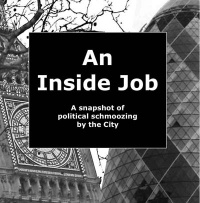
UK: SpinWatch publishes its report about lobbying within the financial services sector, An Inside Job: A Snapshot of Political Schmoozing by the City. Highlighting the lobbying ‘clout’ of consultancies such as Brunswick and Finsbury, the report also outlines tactics employed by industry bodies such as the British Bankers’ Association (BBA), concluding:
- We currently have no way of knowing what lobbying is under way in relation to banks and the financial sector, and how such lobbying might be harmful to the public interest. Transparency is needed if we're to have government accountability on these issues.
Assistant director of the BBA, Brian Capon, responds saying:
- Of course we talk to ministers and other parliamentary officials - that's part of our job and the two-way communication is valuable in establishing a greater understanding between us. To suggest these meetings are 'secret' simply fuels the media hype that surrounds the issue, which brings us back to the reason why it's important for us to engage in lobbying in the first place - to put forward the industry's views and put the record straight[127]
February 8th
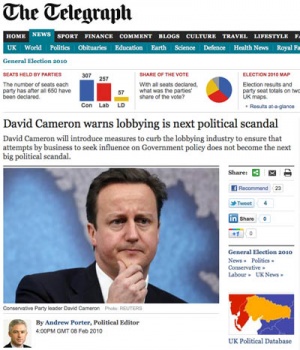
David Cameron announces he will introduce measures to curb the lobbying industry. The Telegraph reports:
- He said: “Now we all know that expenses has dominated politics for the last year. But if anyone thinks that cleaning up politics means dealing with this alone and then forgetting about it, they are wrong. Because there is another big issue that we can no longer ignore.
- “It is the next big scandal waiting to happen. It’s an issue that crosses party lines and has tainted our politics for too long, an issue that exposes the far-too-cosy relationship between politics, government, business and money.”
- The Conservative leader said that the “£2 billion industry” has a big presence at Westminster and take in some cases MPs are approached more than 100 times a week by lobbyists.”
The article continued:
- David Miller of the Alliance for Lobbying Transparency welcomed Mr Cameron’s admission that something needs to be done about lobbying.
- But he added: “If they are serious about listening to ordinary people, the Conservative Party must pledge to introduce a mandatory register of lobbyists as soon as possible so that the public can see who is lobbying whom, and the extent to which national policies are being influenced by commercial forces.”[128]
February 28th
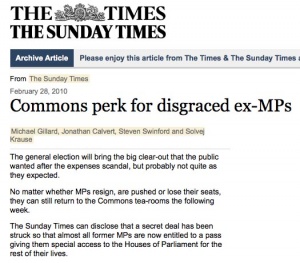
The Sunday Times reveals that disgraced ex-MPs will still be able to gain access to Parliament. The article states:
- "No matter whether MPs resign, are pushed or lose their seats, they can still return to the Commons tea-rooms the following week.
- The Sunday Times can disclose that a secret deal has been struck so that almost all former MPs are now entitled to a pass giving them special access to the Houses of Parliament for the rest of their lives."[129]
March 14th
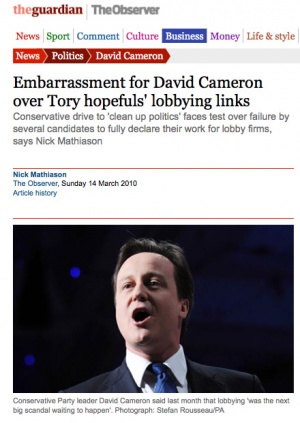
UK: The Observer reports that ‘David Cameron’s drive to clean up politics is facing an embarrassing test’. It emerged that numerous prospective Tory MPs – including Priti Patel, Penny Mordaunt, and George Eustice - failed to declare in their election campaign material that they work for lobbying firms on behalf of big business. These ‘secret lobbyist candidates’ are the subject of an online ‘advertising blitz’ orchestrated by campaign group 38 Degrees.[130] Nick Mathiason notes that:
- The Observer is aware of a significant number of parliamentary candidates who will be unmasked in coming days as part of a co-ordinated campaign by SpinWatch and 38 Degrees aimed at introducing a statutory register of interests. This would force lobby firms and parliamentary candidates to clarify who they represent and work for.[130]
March 22nd
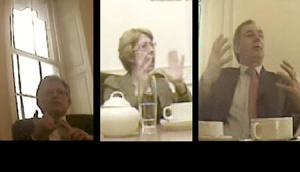
UK: Channel 4 broadcast Dispatches - 'Politicians for Hire' which reveals how 'politicians are offering to help companies and lobby the government for salaries of up to £5,000 a day'.[131]
The Guardian reports:
- Three former cabinet ministers, Geoff Hoon, Stephen Byers and Patricia Hewitt were suspended from the Parliamentary Labour party last night in an unprecedented crack down on sleaze.
- The move was implemented by the party's chief whip, Nick Brown, and fuelled by backbench revulsion at claims that the trio had been using their ministerial experience to seek profitable lobbying consultancies.
- The decision was taken by Number 10 after party officials watched a Channel 4 programme which secretly recorded the former ministers expressing a desire to work for a consultancy firm at a fee of up to £5,000 a day. Byers, the former cabinet minister, described himself as a "cab for hire".[132]
UK: Following the March 2010 Sunday Times and Dispatches joint exposé - in which senior politicians were recorded offering to help the private sector lobby the government - the Labour Government made an announcement on 22 March 2010 outlining its commitment to the introduction of a statutory register of lobbyists. In an interview for Sky News, Foreign Secretary David Miliband remarked that ‘the Labour manifesto is going to say more about the need for a statutory register of the lobbying industry, because there is absolutely no room for the sort of innuendo or promises that seem to have been floated in this case’.[133] Prior to the negative headlines, David Singleton of PR Week writes, ‘Labour insiders admitted the party had merely been 'considering' making a statutory code as a manifesto commitment’[134]
The Labour Government was not, however, alone in their attempts at damage limitation. Lobbyists were similarly provoked into ‘an impromptu PR offensive’[135] with the aim of salvaging the industry's reputation. At the forefront of this were CIPR's former president Lionel Zetter and Warwick Smith of College Public Policy, who duly produced a series of ‘key media lines’ for those required to discuss the issue: ‘This is not about lobbyists; none were involved’; ‘It is about politicians doing things for which they were not elected’; ‘You can be a lobbyist or a legislator, but not both’; ‘It is frustrating that politicians are proposing tougher regulation of the industry when this issue is all about them, and the UK industry has put its house in order’.[135]
Despite their best attempts to avoid this ‘tougher regulation of the industry’, Labour's plans for a statutory register of lobbyists were already in motion. Cabinet Office minister Angela Evans Smith wrote to Sir Philip Mawer, Chairman of UKPAC's Implementation Group, saying:
- As you know we have taken the decision to have a statutory register of lobbyists. The work that you and the Council are doing to produce a voluntary register will help in the work of delivering a statutory register and I would encourage those who are considering signing up to the voluntary register to do so.[136]
Writing in Public Affairs News, Mark Adams (Deputy Chairman of UKPAC's Implementation Group) responded, arguing that:
- [T]here are some serious issues about a statutory register that must be addressed. How will the enforcement of a statutory register be paid for? If, as some have argued, it is to be paid for by the 'lobbying industry', it will introduce an astonishing tax on democracy. Any organisation wishing to make its case to government or Parliament will first have to register and pay a fee to exercise its right to lobby. Is that desirable?Cite error: Closing
</ref>missing for<ref>tag Whereas Francis Ingham of PRCA argues that the Conservatives are ‘right in resisting the temptation to match Labour’s volte face’[137], Alastair Ross from the Association for Scottish Public Affairs (ASPA) argues that the Conservative position ‘has changed with the public mood’.[137]
May 11th
UK: The commitment to a statutory register became one of the concessions made by the Conservatives in securing their coalition with the Liberal Democrats[138] On May 11 2010, a series of agreements was reached between the Conservatives and Liberal Democrats. With regard to political reform, the agreement document states:
- The parties will tackle lobbying through introducing a statutory register of lobbyists. We also agree to pursue a detailed agreement on limiting donations and reforming party funding in order to remove big money from politics.[139]
As PR Week journalist Singleton (2010) observes, the UKPAC ‘is keen to exert influence over ministers' plans for a statutory register of lobbyists by coming up with the first detailed blueprint for such a scheme.’[140] Accordingly, CIPR's Iain Anderson remarks that ‘It is good news that... UK PAC [is welcomed] as the statutory model'.[137] In an interview with PR Week, Elizabeth France commented that her organisation's aim is
- a smooth transition between the self-regulating approach and the introduction of a statutory register. That will require us to understand the scope of the register envisaged by the Government and to see how far we can reach agreement to anticipate it.[140]
June
UK: Despite UKPAC favouring self-regulation, a ComRes poll of 285 public affairs practitioners published by Public Affairs News finds that a majority of lobbyists now support a statutory register. Sixty-two per cent of respondents supported the statutory register, with 20 per cent undecided and 17 per cent opposed. Furthermore, of those polled, only 55 per cent were 'familiar' with UKPAC; with 53 per cent believing that UKPAC still has time to play a role within the industry. Commenting on the findings, the APPC remarked that: [T]he results reflect the wide array of views among PA professionals and, indeed, APPC members. We believe that self-regulation works and that UK PAC has a vital role to play in extending transparency across the wider industry. Nevertheless, the APPC is not necessarily antagonistic towards a statutory system of registration. The PRCA, on the other hand, responded saying: We are loathe to be dismissive of any poll, but the picture it paints of industry enthusiasm for government action bears little relation to the reality we see. The simple, settled majority view of the industry is that self-regulation works.[138]
A poll of lobbying firms carried out by the APPC yielded similar results. While three quarters of respondents agreed or strongly agreed that self-regulation was working, the same proportion would support a statutory register - only if it included all lobbyists. While 64% of those polled agreed that a statutory register would be more effective than self-regulation, 83% were in favour of the ethics and activities of lobbyists being regulated by an umbrella body established by trade associations - rather than by a mandatory regulation introduced by the Government[141]
UK: Labour MP for Wigan Lisa Nandy submits a written question about the timeline of plans for the statutory register to the Conservatives' Mark Harper. Nandy remarks:
It was one of the pledges in the Coalition Agreement [published by the Conservatives/Lib Dems in May] that raised more questions than it answered. I’m keen to see more transparency in politics but it’s not at all clear from the detail released so far how the government intends to achieve it.[142]
In responding, Harper - who has ministerial responsibility for Political and Constitutional Reform – states:
Ministers will meet representatives of the UK Public Affairs Council shortly to discuss how to create the most effective register, on a statutory footing. We hope to publish detailed plans in the autumn.[142]
June 29th
UK: Labour MP Kelvin Hopkins lodges the following Early Day Motion regarding a statutory register of lobbyists, attracting 104 signatures:
- That this House notes the commitment by the new coalition Government to establish a statutory register of lobbyists; recalls the personal commitment of the Deputy Prime Minister to introduce a statutory register; believes that such a register should be independently managed and enforced, that it should include information provided by both lobbyists and those being lobbied and provisions ensuring effective financial disclosure; and calls on the Government to bring forward the necessary legislation as a matter of urgency.[143]
July
UK: The UK Public Affairs Council (UKPAC) is officially established. UKPAC is an umbrella organisation formed by representatives from the Chartered Institute of Public Relations (CIPR), the Association of Professional Political Consultants (APPC) and the Public Relations Consultants Association (PRCA); which ostensibly ‘promotes and upholds effective self-regulation for those engaged in public affairs’ by the means of the quarterly publication of a voluntary register of lobbyists.[144] UKPAC employs the following definition of lobbying:
- Lobbying means in a professional capacity, attempting to influence, or advising those who wish to influence, the UK Government, Parliament, the devolved legislatures or administrations, regional or local government or other public bodies on any matter within their competence. This covers members who spend all or a significant amount of their time (for example at least 20% of their professional working time) on lobbying activities. Members who do less than 20% may register at their discretion..[111]
The aim of UKPAC is, according to the official terms of reference:
- to promote public confidence in those who, in a professional capacity, undertake lobbying by encouraging and sustaining high ethical standards, transparency and accountability amongst those whom the Council regulates. It will offer a system of voluntary regulation to ensure that all those involved in lobbying institutions of government can be governed by a clear set of principles, underpinned by enforceable Codes of Conduct. Further, it will assist public confidence by establishing a publicly accessible Register of those involved in lobbying, indicating the organisations on whose behalf they are lobbying.[145]
The CIPR ‘sees UK PAC as an opportunity to create a meaningful register which distinguishes between those [lobbyists] who are ethical and transparent, and those who are not’..[111] However, the self-regulatory model espoused by UKPAC has been subject to extensive criticism. Speaking following the launch of UKPAC, Tamasin Cave of the Alliance for Lobbying Transparency (ALT) - a coalition of civil society groups which campaigns for a mandatory register - remarked that:
- This is the old system of self-regulation by another name, a system that was described last year by the influential Public Administration Select Committee as 'little better than the emperor’s new clothes'. Recent events show such a voluntary system to be totally ineffective. UKPAC is yesterday's solution. Joining UKPAC is voluntary, which means that lobbyists will continue to hide who they are lobbying for simply by not signing up. As a result, the public will stay in the dark over who is lobbying to change government policy, whether it’s defence companies bidding for multi-million pound contracts, private healthcare companies influencing NHS decisions, or supermarkets fighting new labeling rules.[146]
July 12th
UK: Labour MP Austin Mitchell lodges the following Early Day Motion regarding a statutory register of lobbyists, attracting 21 signatures:
- That this House welcomes the commitment by the Coalition Government to introduce a statutory register of political lobbyists; notes that a recent ComRes survey finds that such an approach would have the support of 62 per cent. of lobbyists; expresses its concern, however, that unless underpinned by a statutory code of ethical practice to which registrants would have to adhere, the implied credibility of statutory registration could be enjoyed by practitioners who do not act ethically and who indeed may even breach the law; observes that such a situation would be completely unacceptable; and urges the Government to ensure that from the moment of its introduction the registration process includes a specific obligation to comply with statutory ethical principles.[147]
July 27th
UK: The Coalition Government publishes a report on July 27th 2010 outlining target dates for political reform. As part of its measures to improve transparency, the report indicates that the process to introduce legislation to implement a statutory register would commence on November 2011.[148]
July 29th
UK: The debate turns to the role of think-tanks within lobbying legislation. The blueprints developed by UK PAC as yet omit think-tanks from a statutory register. The (voluntary) register employed by the European Commission, on the other hand, features a sub-category for think-tanks; with 95 currently registered. However, as Public Affairs News journalist Hall suggests: 'the think-tank landscape is tricky to delineate, populated on its nebulous fringes by some organisations, alliances and councils that are little more than corporate front-groups'.[149]
November 15th
UK: PR Week reports that CIPR members who lobby are ‘urged to sign up to the UK Public Affairs Council (UKPAC)’s lobby register within the next 10 weeks. Those who fail to register by the end of January will face ‘non-compliance sanctions’ from the CIPR.[150]
December 2nd
The winners of the Worst EU Lobbying Awards 2010 are revealed:
- RWE (npower), Goldman Sachs and derivatives lobby group ISDA have been given the dubious honour of being named the Worst EU Lobbyists of 2010. The results of the dual climate and finance categories of the Worst EU Lobbying Awards 2010 were revealed today during a ceremony outside the ISDA office in Brussels.[151]
2011
February
UK: UKPAC’s register is expected to launch publicly. It will be electronically searchable.[150]
March 1st
UK: Paul Flynn MP noted the launch event of the UKPAC register on his blog: 'On a very busy day, I called into their woefully unimpressive presentation. I'm glad I did.'[152] Public Affairs News takes up the story:
- The register launched on 1 March at a well-attended event including bosses of some of the country’s largest PA agencies, pack in to the grand committee room off Westminster Hall. But the Alliance for Lobbying Transparency (ALT)’s Tamasin Cave and Labour MP Paul Flynn piled in with criticism of the register, saying that it reveals little new information.
- Flynn – who is a member of PASC – followed up various caustic comments at the launch event by writing on his blog that the register was merely “a website of telephone numbers and client names” and that, as a response to PASC’s report, it was “not big, it is on a protozoan scale, a token, a nothing. Paul Flynn MP described the journey made by the industry in what is now more than two years since the public administration select committee (PASC) report into lobbying as “tortuously slow”.”.[153]
In another Public Affairs News article, reporter Ian Hall states:
- "I spoke to numerous senior industry figures the day after the register’s launch and detected a definite change of mood among some of those who, until now, have cautiously defended UKPAC. One usually on-message senior figure described the register’s lack of revelation as embarrassing.
- It may only just have launched, but so long as UKPAC’s register remains in its current form, the Cabinet Office cannot take it seriously as the model government should follow when launching the statutory register.[154]
On his own personal blog, Flynn was scathing of the launch event:
- As a piece of lobbying this event was a disaster. These people are professional bull-shitters. If they cannot promote themselves why should anyone pay them to promote other causes?[155]
May 11th
EU: MEPs vote to support mandatory lobby transparency register. An ALTER-EU press release stated:
- A new common EU Parliament – Commission lobby transparency register is a small step forward, campaigners said today, following its approval by MEPs in the plenary session of the EU Parliament, but they added that further steps are needed to make the new register effective and reliable.
- ALTER-EU said they were pleased that MEPs had voted in plenary to make the new joint lobby transparency register mandatory in the near future and said that such a step was crucial as voluntary registration allowed too many lobby firms to avoid scrutiny. ALTER-EU said it was disappointed there was no majority for a proposal for stricter financial reporting.[156]
August 18th
UK: A Guardian investigation reveals Adam Werritty's involvement in the arrangement of a Dubai meeting between Liam Fox and Harvey Boulter, the boss of Porton Capital. Although not a government employee, Werritty purported to be an official adviser to Fox and had business cards stating such. At the meeting a bitter legal battle between Boulter's Porton Capital and 3M, the US Post-it note maker, was discussed. The Guardian reported:
- Fox has repeatedly denied that he was personally involved in the case but he faces the embarrassment of being forced to give evidence about allegations of blackmail in a US court.
- Werritty, who has been a close friend of Fox's for years and was once a housemate, told Harvey Boulter, the boss of Porton Capital, that Fox would meet him at an upmarket hotel in Dubai to discuss the legal battle with 3M.
- The MoD, which has already been forced into one embarrassing U-turn over this case, had claimed Fox and Boulter met to discuss an "entirely different matter".
- But email correspondence between Werritty and Boulter shows that the MRSA technology, called Acolyte, was on the agenda for the meeting at the five-star Shangri-La hotel in Dubai in June.[157]
The Guardian also reported on a possible blackmail charge brought by 3M lawyers as a result of an email sent by Boulter after the Dubai meeting:
- Just hours after the meeting, Boulter fired off an email to 3M's lawyers. It said: "I had a 45-minute meeting with Dr Liam Fox, the British defence minister on our current favourite topic … As a result of my meeting [with Fox] today you ought to know that David Cameron's cabinet might very shortly be discussing the rather embarrassing situation of George's [George Buckley, 3M's chief executive] knighthood." [See footnote.]
- Boulter suggested that a settlement "at a headline of $30m+ will allow MoD to internally save face".
- As a result of the meeting Fox now faces the threat of being forced to give evidence in a US court, after 3M launched a blackmail lawsuit.[157]
October 7th
UK: Liam Fox orders his most senior offical at the Ministry of Defence, the permanent secretary Ursula Brennan, to investigate whether he broke the ministerial code over his working relationship with his close friend Adam Werritty. In an interview on the BBC Fox stated "I have asked the permanent secretary to look into these wild allegations"[158]
October 8th
UK: Contradicting Liam Fox's claim that a Dubai meeting with Harvey Boulter happened by chance, Boulter himself states:
- My first meeting with Werritty was in early April 2011 (don't recall the exact date) in the Shangri-la hotel in Dubai. We had about one hour together where I briefed him on Cellcrypt and the Acolyte litigation. He offered his assistance to help raise these topics to "the boss". At the end of the meeting he very quickly introduced me to Dr Fox who had just arrived in the lobby – it was a handshake only.
- Over the next months he told me he had briefed the boss and he offered to set up an eventual meeting with Dr Fox to discuss the topics.[159]
UK: David Cameron asks the cabinet secretary, Sir Gus O'Donnell, to examine the findings of the Ministry of Defence's own internal investigation into Liam Fox's links to Adam Werritty.[160]
October 10th
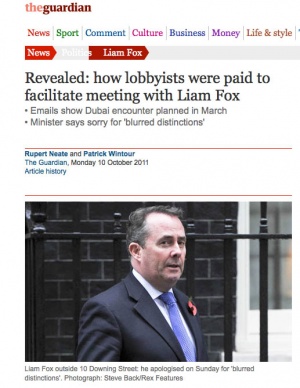
UK: The Guardian reveal that political lobbyists helped to facilitate a secretive meeting between Liam Fox and a Dubai-based businessman and were paid thousands of pounds for doing so. Mr. Fox had previously claimed that the meeting had only come about after a chance meeting in a restaurant. The Guardian reported:
- Invoices seen by the Guardian show that Harvey Boulter, the private equity boss at the heart of the growing controversy engulfing Fox, was paying £10,000 a month to lobbyists for help that included brokering the meeting with Fox through Adam Werritty, who claimed to be an "adviser to the Rt Hon Dr Fox MP".
- This latest revelation comes as Fox finally admitted on Sunday that it had been "wrong" for him to meet Boulter, a commercial partner of the Ministry of Defence, in Dubai's five-star Shangri-la hotel without any officials present.
- "I accept that it was a mistake to allow distinctions to be blurred between my professional responsibilities and my personal loyalties to a friend," he said. "I am sorry for this."
- Fox's apology to the prime minister came two months after the Guardian first asked him to explain his relationship with Werritty, who appears to have been operating in Fox's shadow for a decade.[161]
October 11th
UK: It is revealed that Adam Werritty is to be asked to disclose his full client list and sources of income by the inquiry investigating his close links with the defence secretary, Liam Fox. The Guardian takes up the story:
- When questioned on whether Werritty had a financial relationship with defence companies, Fox's aides said "you need to ask Mr Werritty that" before adding: "He works in international relations, attends security conferences and has private clients."
- Repeatedly asked to say in the Commons whether Werritty had received cash from clients due to his access to him, the normally plain-speaking Fox said: "When it comes to the pecuniary interests of Mr Werritty in those conferences, I am absolutely confident that he was not dependent on any transactional behaviour to maintain his income."[162]
October 13th
UK: The Labour Party question why £170,000 of taxpayers money is being spent on Liam Fox's three official advisers when it appears he prefers the advice of Adam Werritty, best man at Fox's wedding to Jesme Baird. From The Guardian:
- Fox met Werritty 18 times during overseas trips, where he has met heads of state, ambassadors and dined with General John Allen of US Central Command at a steakhouse in Tampa, Florida. The pair have also met at the Ministry of Defence in Whitehall 22 times over the past 16 months.
- Kevan Jones, Labour's defence spokesman, said: "Each day the questions mount up for Liam Fox. He has to explain why he needs Adam Werritty, who appears to be an unofficial adviser, when he has three special advisers costing the taxpayer pay almost £200,000.
- "Adam Werritty has been travelling the world giving the impression he was an official adviser and it would appear Dr Fox has not counteracted this impression. We need answers."[163]
October 14th
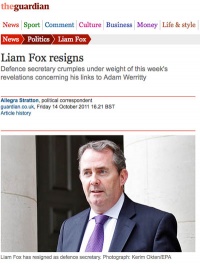
UK: The defence secretary Liam Fox resigns as media scrutiny of Adam Werritty, the man Fox allowed access to the heart of government and British defence strategy, continues. The role of lobbyists in the whole affair is brought to light by several newspaper investigations. The Guardian reports:
- Downing Street insisted Fox had not been pushed into resigning over the activities of his friend Adam Werritty but it was a decision taken by him with "dignity".
- However, senior figures inside Downing Street were worried that the former defence secretary's position had become untenable when fresh stories emerged in the first editions of newspapers on Thursday night. Cameron's team were alarmed that journalists had began to establish where the funding for Adam Werritty's lobbying activities had come from.
- The Times unearthed a corporate intelligence company with a close interest in Sri Lanka, a property investor who lobbies for Israel and a venture capitalist keen on strong ties to fund the £147,000 bill he notched up on travel and hotels, sometimes including first class travel and five-star hotels.[164]
In his resignation letter Liam Fox said:
- As you know, I have always placed a great deal of importance on accountability and responsibility. As I said in the House of Commons on Monday, I mistakenly allowed the distinction between my personal interest and my government activities to become blurred. The consequences of this have become clearer in recent days. I am very sorry for this.[165]
October 15th
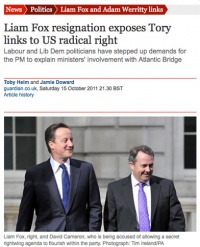
UK: An investigation by The Observer reveals that the scandal surrounding Liam Fox's resignation exposes close links between the Conservative Party and a US network of lobbyists, defence hawks and climate change deniers. From the observer:
- At the heart of the complex web linking Fox and his friend Adam Werritty to a raft of businessmen, lobbyists and US neocons is the former defence secretary's defunct charity, Atlantic Bridge, which was set up with the purported aim of "strengthening the special relationship" but is now mired in controversy.
- An Observer investigation reveals that many of those who sat on the Anglo-American charity's board and its executive council, or were employed on its staff, were lobbyists or lawyers with connections to the defence industry and energy interests. Others included powerful businessmen with defence investments and representatives of the gambling industry.
- Fox's organisation, which was wound up last year following a critical Charity Commission report into its activities, formed a partnership with an organisation called the American Legislative Exchange Council. The powerful lobbying organisation, which receives funding from pharmaceutical, weapons and oil interests among others, is heavily funded by the Koch Charitable Foundation whose founder, Charles G. Koch, is one of the most generous donors to the Tea Party movement in the US. In recent years, the Tea Party has become a potent populist force in American politics, associated with controversial stances on global warming.
- Via a series of foundations, Koch and his brother, David, have also given millions of dollars to global warming sceptics, according to Greenpeace.[166]
October 16th
UK: The BBC reveal that the City of London Police are considering whether to investigate Adam Werritty over possible fraud charges after Labour MP John Mann asks for a probe into allegations Adam Werritty falsely claimed he was an adviser to Liam Fox. The BBC report:
- A City of London Police spokesman confirmed they had received an allegation of fraud.
- "Officers from the force's economic crime directorate will consider the matter and establish whether or not it is appropriate to launch an investigation."
- Mr Mann said he was also considering asking the Electoral Commission - which regulates political parties and their funding - to consider whether Mr Fox should face criminal proceedings over a failure to declare political donations.
- The latest comes after venture capitalist Jon Moulton on Friday said Mr Fox approached him after the election seeking funds for Pargav - a non-profit company set up by Mr Werritty.[167]
UK: In a related development, ministers indicate that David Cameron and the Conservative Party will move forward with plans to regulate political lobbyists in the wake of the Liam Fox and Adam Werritty scandal.[168]
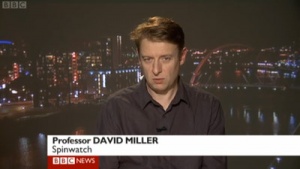
UK: In the wake of the Adam Werritty scandal and amid renewed calls for a statutory register of lobbyists, David Miller of Spinwatch is interviewed on the BBC 10 O'Clock News. Miller said:
- The notion of self-regulation is already acknowledged by almost everybody to have been tried and to have failed and we need to move fairly rapidly now to the consultation which the government has been promising for some time. It should have happened last year, they are now saying it will be before the end of this year and then next year we’ll get statutory powers to regulate lobbyists and that is the key thing.[169]
October 17th
UK: The Independent reveal that Philip Hammond, newly appointed to replace Liam Fox as defence secretary, attended a series of lavish dinners hosted by Michael Hintze, a millionaire hedge fund baron. Hintze, a former Goldman Sachs banker, is listed several times in Hammond's register of interests as a donor. The Independent reports:
- Mr Hintze, one of the richest men in the UK with an estimated fortune of £550 million, donated more than half the budget for a charity, Atlantic Bridge, set up by Liam Fox.
- Yesterday a spokesman for Mr Hammond stressed that the hospitality he had received from Mr Hintze had been properly registered, was above board, and there has been no attempt to hide any aspect of it. The new Defence Secretary is said to like Mr Hintze but does not know him particularly well.[170]
UK: Downing Street state that new proposals to regulate lobbying will not be sped up in light of the row over Liam Fox and his close relationship with Adam Werritty. The PM's official spokesman said:
- "These are separate things. There's always been a policy to move to a statutory register (of lobbying). That work has been on-going."[171]
October 19th
UK: Liam Fox makes his resignation statement in the House of Commons. In his statement Fox attacks the media for its "vindictiveness, even hatred" in their pursuit of him over his links to Adam Werritty.[172]
The parliamentary standards commissioner announces that there will be a fresh investigation into Liam Fox's links with Adam Werritty after a complaint was made by Labour MP John Mann. The Guardian reports:
- John Mann wrote to John Lyon last week asking him to examine allegations that Fox allowed Werritty to live rent-free in his London flat which allowed him to run a business from a property funded by parliamentary allowances.
- A spokesman for Lyon said: "The commissioner has received a complaint from John Mann and he has accepted it."[172]
October 23th
UK: The Shadow defence secretary Jim Murphy writes to No 10 demanding the prime minister "reveal the full extent of the wrongdoing which took place at the heart of government". Murphy continued "We still do not know the full facts about the money trail which led to the resignation of the Rt Hon Member for North Somerset, we do not know the true role and motivations of Mr Werritty, and we do not know who exactly in the government met Mr Werritty and whether there was any prior knowledge of the former defence secretary's activities."[173]
October 26th
UK: The Guardian reveal that Stephen Crouch, a defence lobbyist, gained access to a meeting with the arms sales minister Gerald Howarth, after secretly donating £20,000 to fund Adam Werritty's expenses. The Guardian reports:
- Crouch, a Tory donor and activist, has links with former special forces officers such as Tony Buckingham, who now runs Heritage Oil, and Tim Spicer, who runs the Aegis security company in Iraq. Crouch is on record lobbying for contracts in Iraq, in association with a former MI6 officer, Rupert Bowen, and a former UK ambassador to the Middle East, Julian Walker.[174]
The Guardian reveal more details about the meeting between Crouch and Howarth:
- According to the Ministry of Defence, the meeting Crouch arranged with Howarth on 27 September took place with no officials present. The MoD said: "The cabinet secretary has recommended that in future where discussions take place with external organisations … where an official is not present, ministers should inform their department."[174]
The revelation that a second defence minister (Howarth) had met one of Werritty's sercretive donars leads to fresh calls from the Labour Party to renew the investigation into Adam Werritty. The Guardian takes up the story:
- Kevan Jones, shadow defence minister, said revelations over Howarth's meeting with Crouch showed the PM had allowed wrongdoing to take place on his watch.
- "The prime minister has for weeks said all questions would be answered but instead we have only had new allegations," Jones said.
- "It appears another defence minister may have broken the ministerial code and has links to Adam Werritty. We need a full explanation as to how this meeting was arranged and why no civil servants were present. If it was discovered that anyone was profiting from these connections this would be extremely serious."[175]
Bibliography
- 38 Degrees (2010b) ‘Ban Secret Lobbying Now’, http://38degrees.org.uk/page/speakout/lobbyinglawsnow accessed 20.11.10
- William Dinan, (2006) "Learning lessons? The registration of lobbyists at the Scottish parliament: A reply to Coldwell", Journal of Communication Management, Vol. 10 Iss: 1, pp.55 - 66
Notes
- ↑ 1.0 1.1 1.2 1.3 Public Affairs Links (2007) ‘A Brief History of Lobbying’, The History of Lobbying, http://www.publicaffairslinks.co.uk/Help%20Guides/The%20History%20of%20Lobbying%20(guide1).doc accessed 20.11.10
- ↑ Byrd, R. C. (1987) ‘Lobbyists’, United States Senate, http://www.senate.gov/legislative/common/briefing/Byrd_History_Lobbying.htm accessed 20.11.10
- ↑ ‘Brief History – Minnesota Statutes Chapter 10A’, Ethics in Government Act: Lobbyist Registration and Reporting Statutes, Campaign Finance and Public Disclosure Board, 2007.
- ↑ 4.0 4.1 4.2 4.3 Guardian staff and agencies, 'Chronology - How the scandal unfolded', The Guardian, 22 December 1999.
- ↑ Lord Brown-Wilkinson, 'Judgments - Hamilton v. Al Fayed', 22 March 2000.
- ↑ 6.0 6.1 6.2 6.3 Burrell, M. 'History of lobbying & of the APPC', APPC, 2006.
- ↑ 7.0 7.1 7.2 7.3 7.4 7.5 7.6 7.7 Rush, M. Rush, M.R 'Registering the Lobbyists: Lessons from Canada', Political Studies, 4: 630-645, 1994.
- ↑ Rush, M., C. Seymour-Ure, P. Norton and M. Shaw, 'Memorandum submitted by Dr Michael Rush, Professor Colin Seymour-Ure, Professor Philip Norton and Mr Malcolm Shaw', Evidence on parliamentary lobbying, 1988.
- ↑ Rush, M. 'Minutes of Evidence taken before the Select Committee on Members' Interests', Evidence on parliamentary lobbying, 14 June 1988.
- ↑ Rush, M. 'Memorandum from Dr Michael Rush, University of Exeter', Evidence on parliamentary lobbying, 1990.
- ↑ Bevan, S. 'PROFILE: Andrew Gifford, GJW; Charmer with political clout', PR Week UK, 08.03.96.
- ↑ Hencke, D.'Tory MPs were paid to plant questions says Harrods chief', The Guardian, 20 October 1994.
- ↑ 13.00 13.01 13.02 13.03 13.04 13.05 13.06 13.07 13.08 13.09 13.10 13.11 13.12 13.13 13.14 13.15 13.16 13.17 13.18 13.19 13.20 'History of the Committee', Committee on Standards in Public Life, 2010
- ↑ 14.0 14.1 14.2 14.3 Roth, A. 'Obituary: Lord Nolan, Committee chairman charged with keeping MPs up to standard', The Guardian, 26.01.07.
- ↑ Michael White, 'The Sinking of Hamilton', The Guardian, 26 October 1994
- ↑ 16.0 16.1 16.2 16.3 16.4 16.5 BBC Research, 'Neil Hamilton - A chronology', BBC, 19 October 1998.
- ↑ 'The Seven Principles of Public Life (or the Nolan Principles', Commissioner for Public Appointments, 2010.
- ↑ 18.0 18.1 'DIARY: APPC is coy about revealing register', PR Week UK, 10.11.95.
- ↑ 'DIARY: APPC moves towards easy register access', PR Week UK, 15.03.96.
- ↑ Kevin Williams, '‘Only Flattery is Safe’: Political Speech and the Defamation Act 1996', The Modern Law Review, Volume 60, Issue 3, pages 388–393, May 1997.
- ↑ David Hencke, David Leigh and David Pallister, 'A liar and a cheat', The Guardian, 1 October 1996.
- ↑ Dowman, R. 'NEWS: APPC takes action to maintain integrity', PR Week UK, 25.10.96.
- ↑ David Hencke and Ewen Macaskill, 'I'll fight this poison', The Guardian, 8 April 1997.
- ↑ Luke Harding and David Pallister, 'He lied and lied and lied', The Guardian, 21 June 1997.
- ↑ Barker, S. ‘APPC reviews sponsorship rules’, PR Week UK, 27.03.98.
- ↑ Palast, G. and Barnett, A. 'Lobbygate: Cash for Access', The Observer, July 1998.
- ↑ Barker, S. ‘APPC lends support to single lobbyists code’, PR Week UK, 17.07.98.
- ↑ Dean Nelson and Ben Laurance Exposed: Lobbygate comes to Scotland Dewar demands investigation after PR firm claims it influenced policy, The Observer, Sunday 26 September 1999 13.56 BST
- ↑ 'Scotland Minister denies destruction of evidence', BBC, 24 October 1999.
- ↑ 'Hamilton 'took £30,000 bribe'', BBC, 18 November 1999.
- ↑ Matt Wells, Jamie Wilson and David Pallister, 'A greedy, corrupt liar', The Guardian, 22 December 1999.
- ↑ 32.0 32.1 Standards Committee Lobbying in the Scottish Parliament Standards Committee Consultation Paper SP Paper 200 Session 1 (2000)
- ↑ Miller, David and Schlesinger, P. and Dinan, W. (2000) Submission to standards committee consultation on lobbying the Scottish Parliament, 5 December. Discussion paper. Scottish Parliament, Edinburgh, UK. (Unpublished)
- ↑ Douglas Fraser, 'Mound more secretive than Westminster: Academics reveal the true extent of silent power at Scottish parliament', Sunday Herald, Jan 14 2001.
- ↑ 35.0 35.1 SCOTTISH CODES OF CONDUCT - BEN BOLD REPORTS ON MOVES TO ENSURE SCOTTISH PARLIAMENT IS WIPING THE LOBBYING SLATE CLEAN PR Week February 2, 2001 Pg. 14
- ↑ 36.0 36.1 Ian Coldwell 'Lobbyists Don't Letter in the Sunday Herald, 21 January 2001
- ↑ David Miller, William Dinan and Philip Schlesinger Media Research Institute, 'Inner lobby life', Sunday Herald Readers Views, January 28, 2001, Pg. 8
- ↑ Ben Bold, 'Scottish codes of conduct - Ben Bold reports on moves to ensure Scottish Parliament is wiping the lobbying slate clean', PR Week UK, 2 February 2001.
- ↑ Simon Nayyar, 'Standards Committee Inquiry into Lobbying in the Scottish Parliament', PRCA - Letter to SMRI, 23 February 2001.
- ↑ Scottish Parliament Standards Committee Official Report Meeting 3, 2001, Wednesday 28 February 2001
- ↑ ESRC Political Communication and the Scottish Parliament Start date: 01 April 1999 End date: 31 December 1999
- ↑ 42.0 42.1 Edinburgh University Press Open Scotland? Journalists, Spin Doctors and Lobbyists, accessed 17 September 2011
- ↑ 43.0 43.1 43.2 43.3 William Dinan, David Miller and Philip Schlesinger, 'Supplementary Evidence to Standards Committee Consultation on Lobbying the Scottish Parliament', Stirling Media Research Institute, University of Stirling, March 2001.
- ↑ John Innes, 'Academics call for lobby groups to be regulated', The Scotsman, 1 March 2001.
- ↑ Olga Wojtas, 'Stirling confronts mistrust of politics', Times Higher Education, 9 March 2001.
- ↑ 'On your lobby-horse', The Times Higher Education Supplement, 9 March 2001.
- ↑ Juliette Garside, 'Is our view of ministers being blurred by presenters' tips?', Sunday Herald, 18 March 2001.
- ↑ Douglas Fraser. 'Whisper it... we're still a secret society. Devolution was supposed to herald a more open and accountable parliament. Instead it is just as reluctant to reveal the truth as Westminster', Sunday Herald, New focus, Mar 25 2001.
- ↑ 49.0 49.1 49.2 49.3 49.4 'Unreal world: Empirical research is more and more sidelined in favour of grand theory. Three Scottish academics show what can be done if you're prepared to examine the real world. John Crace reports' The Guardian Education: Higher, Tuesday March 27, 2001.
- ↑ Arnold Kemp, 'When spin takes over', The Observer, 8 April 2001.
- ↑ Peter Preston, 'The break-up of Britain', 23 April 2001.
- ↑ 52.0 52.1 Standards Committee Consultation Paper: Statutory Registration of Commercial Lobbyists June 2001 Session 1 (2001)
- ↑ Ian Hargreaves, 'OPEN SCOTLAND? JOURNALISTS, SPIN DOCTORS AND LOBBYISTS', 11 June 2001.
- ↑ Prof. Justin Greenwood, Statutory Registration of Commercial Lobbyists, 16 July 2001.
- ↑ Michelle Perry, 'Fears grow over 'lobbyist' firms', Accountancy Age, 16 August 2001.
- ↑ 56.0 56.1 56.2 Dr. David Miller, William Dinan and Professor Philip Schlesinger, Response to the Standards Committee Consultation paper Statutory Registration of Commercial Lobbyists, June 2001, Stirling Media Research Institute, Stirling University, Stirling FK9 4LA August 2001
- ↑ 'Scottish PA consultants watch out', PR Week, 17 August 2001.
- ↑ Joe Lepper, 'Scots Parliament lobbying conduct code in quandary', 17 August 2001.
- ↑ Neil Mackay 'Rogue lobbyists could face prison', Sunday Herald, 19 August 2001, p.2
- ↑ David Scott, 'CALL TO MAKE POLITICIANS' DIARIES AVAILABLE FOR PUBLIC SCRUTINY', The Scotsman, pg. 8, 20 August 2001.
- ↑ Dr. David Miller, William Dinan and Prof. Philip Schlesinger, 'Essential to regulate lobbyists', The Scotsman, 22 August 2001.
- ↑ Dr. David Miller, William Dinan and Professor Philip Schlesinger, 'Why lobbyists need to be scrutinised', The Herald (Glasgow), 22 August 2001.
- ↑ Robert M Armstrong, 'Facts of life in running trade associations', 24 August 2001.
- ↑ Jack Irvine, 'Glaring inequality in proposals for lobbyists', The Herald (Glasgow), 24 August 2001.
- ↑ Ian Coldwell, 'Porridge lobbying', Sunday Herald, 26 August 2001, p. 8
- ↑ Ian Coldwell, 'Lobbying curbs', The Scotsman, 27 August 2001.
- ↑ Dr. David Miller, William Dinan and Professor Philip Schlesinger, 'Task of ensuring openness in public life', The Herald (Glasgow), August 29, 2001, Pg. 17.
- ↑ David Miller, William Dinan and Philip Schlesinger, 'Lobby industry', The Scotsman, 30 August 2001.
- ↑ Iain D Duff, 'Against regulation', The Scotsman, 1 September 2001.
- ↑ Sunday Herald 'Lobbying debate' Readers Views 2 September 2001, Dr. David Miller, William Dinan and Professor Philip Schlesinger, Stirling Media Research Institute
- ↑ David Miller, William Dinan, Philip Schlesinger, 'Rearguard action', The Scotsman, 6 September 2001.
- ↑ Jason Allardyce and Brian Brady, 'God on their side?', Scotland on Sunday, 12 May 2002.
- ↑ Jason Allardyce, 'Christians plot political infiltration', Scotland on Sunday, 12 May 2002.
- ↑ Row erupts over trip to States Daily Telegraph, 10:38AM BST 29 Jun 2002
- ↑ 7 October 2002; See also David Miller (2002) 'A question of privilege', Scottish Left Review, Issue 13 November/December: 12-13.
- ↑ ESRC Broadcast details Title Good morning Scotland Description Interview on the Scottish Parliament Business Exchange 08 October 2002Corporate Public Relations in British and Multinational Corporations Grant reference: R000238993
- ↑ Jempson, M. 'Spinners or sinners? PR, journalists and public trust’, Journal of Communication Management, 9(3): 267-276, 2005.
- ↑ Keeble, R. L. 'Journalism as political practice: A new, radical look at media ethics', 2009: 10.
- ↑ CPBF Spin and Corporate Power: Seminar at Strathclyde University, 18/9 Nov. 2004, Accessed 19 September 2011
- ↑ Spinwatch gets a great launch, Free Press, No. 143, November-December 2004, p. 3.
- ↑ 81.0 81.1 PR Week (2004) ‘Diary: SpinWatch spins own website launch’ PR Week UK, 26.11.04
- ↑ 'The ALTER-EU Coalition’, ALTER-EU, 2010.
- ↑ David Miller and William Dinan, Re: European Transparency Initiative, Letter to Commissioner Siim Kallas, 27 April 2005
- ↑ 84.0 84.1 Diary: Anti-spinners set for Edinburgh tour PR Week UK, 01 July 2005, 4:45pm
- ↑ SpinWalk in Edinburgh announced, Red Pepper, Make the G8 History Blog, Tuesday, 28 June 2005
- ↑ Lobbycontrol Europäische NGOs fordern mehr Lobby Transparenz in der EU 20. Juli 2005 | Ein Kommentar
- ↑ Dinan, W. 'Bursting the Bubble: Lobbying transparency and regulation in Europe’, Presented at the ‘Regulating Ethics and Lobbying: What Can Europe and North America Learn from Each Other?', transatlantic workshop at the European Union Center of Excellence, Université de Montréal, 25.05.09.
- ↑ 88.0 88.1 , ‘About ALTER-EU’, ALTER-EU, 2010.
- ↑ 'Lobbying: Access and influence in Whitehall - Public Administration Committee', House of Commons - Public Administration Committee, Spetember 2007
- ↑ Chandiramani, R. accessedhttp://www.conservatives.com/~/media/Files/Downloadable%20Files/agreement.ashx?dl=true 'APPC to toughen code of practice', PR Week UK, 10.11.05.
- ↑ 'Green Paper - European Transparency Initiative', European Union - Europa, 2006
- ↑ Big Blether email list Neoliberal Scotland?: Rethinking Scotland in the global context Department of Geography & Sociology, University of Strathclyde Glasgow, 21st to 22nd May 2006.
- ↑ SpinWatch August 2006 European Transparency Initiative: Consultation Response by William Dinan and David Miller for SpinWatch.
- ↑ 94.0 94.1 'Expert Hearing: Invitation: Lobbying - transparent?', Communication Director - European Parliament
- ↑ Council of Europe Octopus Interface 2006 Conference on “Corruption and Democracy" 20-21 November 2006, Palais de l’Europe, Strasbourg, France
- ↑ Corruption and democracy: Political finances - conflicts of interest - lobbying - justice , Strasbourg: Council of Europe.
- ↑ 97.0 97.1 George Monbiot, 'This lobbying scandal confirms it. The dying days of Labour are upon us', The Guardian, 27 January 2009
- ↑ Singleton, D. 'APPC writes disclosure requirement into Code', PR Week UK, 14.03.07.
- ↑ Claire Newell and Robert Winnett, 'Labour’s lobby scandal', The Sunday Times, 18 March 2007.
- ↑ 'European Transparency Initiative', European Healthcare Fraud & Corruption Network.
- ↑ Parliament PASC launches lobbying inquiry Press Notice 38, Session 2006-07, 21 June 2007
- ↑ War and the Media Network Communication and Conflict: Propaganda, Spin and Lobbying Strathclyde University, Glasgow, 7-9 September, 2007
- ↑ 103.0 103.1 103.2 Singleton, D. 'Campaigners get a rough ride from MPs at select committee', PR Week UK, 31.01.08.
- ↑ James Macintyre, 'Exposed: the arms lobbyist in Parliament', The Independent, 28 June 2008.
- ↑ Andy Rowell, Too Close for Comfort? A report on MEPs, corporate links and potential conflicts of interest', Spinwatch, July 2008.
- ↑ 106.0 106.1 106.2 Ian Hall, Stand-up row at Labour fringe, Public Affairs News 23rd October 2008
- ↑ Campaign for Press and Broadcasting Freedom New pamphlet from SpinWatch: Spinning the Wheels DATELINE: 7/10/08
- ↑ 108.0 108.1 Nicholas Jones, Self-regulation of political lobbying “blown to bits” in Westminster debate. Spinwatch,November 6, 2008
- ↑ Friends of the Earth Europe Agrofuels lobby and Finnish MEP disgraced at Worst EU Lobbying Awards ceremony Press Release, 9 December 2008 For immediate release
- ↑ 'Lobbying: Access and Influence in Whitehall - First Report of Session 2008-2009', House of Commons: Public Administration Select Committee, 2010
- ↑ 111.0 111.1 111.2 'What is United Kingdom Public Affairs Council (UKPAC)?', Chartered Institute of Public Relations, 2010.
- ↑ Flynn, Paul (2009) 'Reform Boost' Read my day: Solid blogging, 27 January 6.01PM http://paulflynnmp.typepad.com/my_weblog/2009/01/fares-for-votes.html
- ↑ 113.0 113.1 David Hencke and Rob Evans, 'Tory peer accused of misusing Lords to boost her own firm', The Guardian, 29 January 2009.
- ↑ David Hencke and Rob Evans, 'MPs accused of failure to reveal business links', The Guardian, 31 January 2009.
- ↑ Colin Fernandez, 'The peers for hire at £25,000 a time...', The Daily Mail, 31 January 2009.
- ↑ Kenneth Haar, Andy Rowell and Yiorgos Vassalos, ' 'Would you bank on them? Why we shouldn’t trust the EU’s financial “wise men”', Corporate Europe Observatory, February 2009.
- ↑ 'About 38 Degrees', 38 Degrees.
- ↑ 'Regulating Ethics and Lobbying: What Can Europe And North America Learn from Each Other? Transatlantic workshop', University de Montreal, 25 May 2009.
- ↑ Cartmell, M. 'NCVO backs lobby register', PR Week UK, 09.06.10
- ↑ Hall, I. 'PASC calls one-off session to discuss regulation of lobbyists', Public Affairs News, 26.06.09.
- ↑ Marie Woolf, 'Spin doctors swoop on 'safe' Tory seats', The Times, August 9 2009.
- ↑ 122.0 122.1 122.2 Singleton, D. 'Industry reacts to Tories’ tough talk', PR Week UK, 02.10.09.
- ↑ 123.0 123.1 Mason, T. 'Government rejects call for lobbying register', Civil Society, 27.10.09
- ↑ PAN Staff, 'Sir Philip Mawer confirmed as chairman of ‘implementation team' for UK Public Affairs Council', Public Affairs News], 16 November 2009.
- ↑ 125.0 125.1 125.2 William Dinan, OECD Consultation on the draft Principles for Transparency and Integrity in Lobbying ALTER EU response November 2009
- ↑ 'Welcome to the Angry Mermaid Award', Angry Mermaid Awards website.
- ↑ Singleton, D. 'Campaigners switch focus to City lobbying', PR Week UK, 19.02.2010.
- ↑ Andrew Porter, 'David Cameron warns lobbying is next political scandal', The Telegraph, 8 February 2010.
- ↑ Michael Gillard, Jonathan Calvert, Steven Swinford and Solvej Krause, 'Commons perk for disgraced ex-MPs', Sunday Times, 28 February 2010.
- ↑ 130.0 130.1 Mathiason, N. 'Embarrassment for David Cameron over Tory hopefuls' lobbying links’, The Observer, 14.03.10.
- ↑ 'Politicians for Hire', Channel 4.
- ↑ Patrick Wintour and Allegra Stratton, 'Stephen Byers and other ex-ministers suspended from Labour party over lobbying allegations', The Guardian, 23 March 2010.
- ↑ Jack, A. and J. Couzens, 'Lobby-For-Cash Sting: Senior MPs 'Appalled', Sky News, 21.03.10.
- ↑ Singleton, D. 'APPC puts Labour on Spot', PR Week UK, 26.03.10.
- ↑ 135.0 135.1 Singleton, D. 'Lobbyists in frantic bid to save industry reputation', PR Week UK, 25.03.2010.
- ↑ PAN Staff, 'Search kicks off for UKPAC's first chairman', Public Affairs News, 1 April 2010.
- ↑ 137.0 137.1 137.2 PAN Staff, 'Dispatches/Sunday Times exposé – industry reaction', Public Affairs News, 31 March 2010.
- ↑ 138.0 138.1 Hall, I. 'Majority of lobbyists now favour statutory register, industry poll reveals’, Public Affairs News, 02.06.10.
- ↑ 'Conservative Liberal Democrat coalition agreements', Conservative Liberal Democrat Coalition Government, 2010: 4.
- ↑ 140.0 140.1 Singleton, D. 'Public Affairs: Register blueprint developed', PR Week UK, 16 July 2010.
- ↑ Miller, S. and Wicks, N. (2010) ‘APPC pledges to be 'proactive'’, PR Week UK, 23.07.10.
- ↑ 142.0 142.1 Hall, I. 'Mark Harper MP to meet UK Public Affairs Council reps 'shortly', Public Affairs News, 02.07.10.
- ↑ Hopkins, K. 'Early Day Motion 339, Statutory register of lobbyists', UK Parliament: Early day motion 339, 2010.
- ↑ 'UK Public Affairs Council', UK Public Affairs Council, 2010
- ↑ 'Terms of Reference for the UK Public Affairs Council', UK Public Affairs Council, 2010
- ↑ 'Tories alone in supporting redundant lobbying industry initiative', Alliance for Lobbying Transparency, 2010.
- ↑ Mitchell, A. 'Early Day Motion 457, Regulation of the lobbying profession', House of Commons - Early day motion 457, 2010.
- ↑ 'Parliamentary Democracy and Political Reform - Draft Political Reform', HM Government, 27.07.10.
- ↑ Hall, I. 'Will Westminster follow Brussels' lead on think-tanks?', Public Affairs News, 29.07.10.
- ↑ 150.0 150.1 PAN Staff (2010c) ‘CIPR members who lobby urged to register with UKPAC’, 15.11.10, Public Affairs News, http://www.publicaffairsnews.com/no_cache/home/uk-news/news-detail/newsarticle/cipr-members-who-lobby-urged-to-register-with-ukpac/73/ accessed 20.11.10
- ↑ 'Winners of Worst EU Lobbying Awards 2010 Revealed!', Worst EU Lobbying Awards website.
- ↑ Paul Flynn, 'Lobbyists' lament', Paul Flynn MP - Read My Day Blog, 10 March 2011.
- ↑ Ian Hall, 'UKPAC boss defends register after launch criticism', Public Affairs News, 9 March 2011.
- ↑ Ian Hall, 'UKPAC at the foothills with a mountain to climb', Public Affairs News, 8 March 2011.
- ↑ Paul Flynn, 'Lobbyists limp response', Paul Flynn MP - Read My Day Blog, 1 March 2011.
- ↑ 'MEPs vote to support mandatory lobby transparency register - ALTER-EU urges swift implementation', ALTER-EU, 11 May 2011.
- ↑ 157.0 157.1 Rupert Neate, 'Liam Fox's friend set up crucial legal meeting', The Guardian, 18 August 2011.
- ↑ 'Liam Fox's ties to best man Adam Werritty under scrutiny', BBC, 7 October 2011.
- ↑ Rupert Neate, 'Harvey Boulter: I met Adam Werritty in April 2011', The Guardian, 8 October 2011.
- ↑ Lisa O'Carroll and David Batty, 'Liam Fox: PM asks cabinet secretary to look at allegations', The Guardian, 8 October 2011.
- ↑ Rupert Neate and Patrick Wintour, 'Revealed: how lobbyists were paid to facilitate meeting with Liam Fox', The Guardian, 10 October 2011.
- ↑ Patrick Wintour and Rupert Neate, 'Liam Fox row: Adam Werritty to be quizzed over sources of income', The Guardian, 11 October 2011.
- ↑ Rupert Neate, 'Labour questions £170,000 cost of Liam Fox's official advisers', The Guardian, 13 October 2011.
- ↑ 164.0 164.1 Allegra Stratton, 'Liam Fox resigns', The Guardian, 14 October 2011.
- ↑ 'Defence Secretary Liam Fox quits', BBC, 14 October 2011.
- ↑ 166.0 166.1 Toby Helm and Jamie Doward, 'Liam Fox resignation exposes Tory links to US radical right', The Guardian, 15 October 2011.
- ↑ 'Fox resigns: Police consider Werritty probe', BBC, 16 October 2011.
- ↑ James Meikle, 'Adam Werritty may be investigated for fraud, police confirm', The Guardian, 16 October 2011.
- ↑ David Miller, Interview on BBC 10 O'Clock News, BBC, 16 October 2011.
- ↑ Kim Sengupta, 'Hammond linked to millionaire backer behind Fox's charity', The Independent, 17 October 2011.
- ↑ 'Number 10 won't speed up lobbying industry regulation', BBC, 17 October 2011.
- ↑ 172.0 172.1 Nicholas Watt, 'Liam Fox faces investigation by parliamentary standards watchdog', The Guardian, 19 October 2011
- ↑ Rupert Neate, 'Fox and Werrity: Labour demands Cameron answers 10 key questions', The Guardian, 23 October 2011.
- ↑ 174.0 174.1 David Leigh and Rupert Neate, 'Donor in Liam Fox scandal revealed as defence lobbyist Stephen Crouch', The Guardian, 26 October 2011.
- ↑ Rupert Neate, Rajeev Syal and David Leigh, 'Cameron under pressure to renew investigation into Adam Werritty', The Guardian, 26 October 2011.
